An inside look: graduate school at EPFL. Part 4.1: daily life
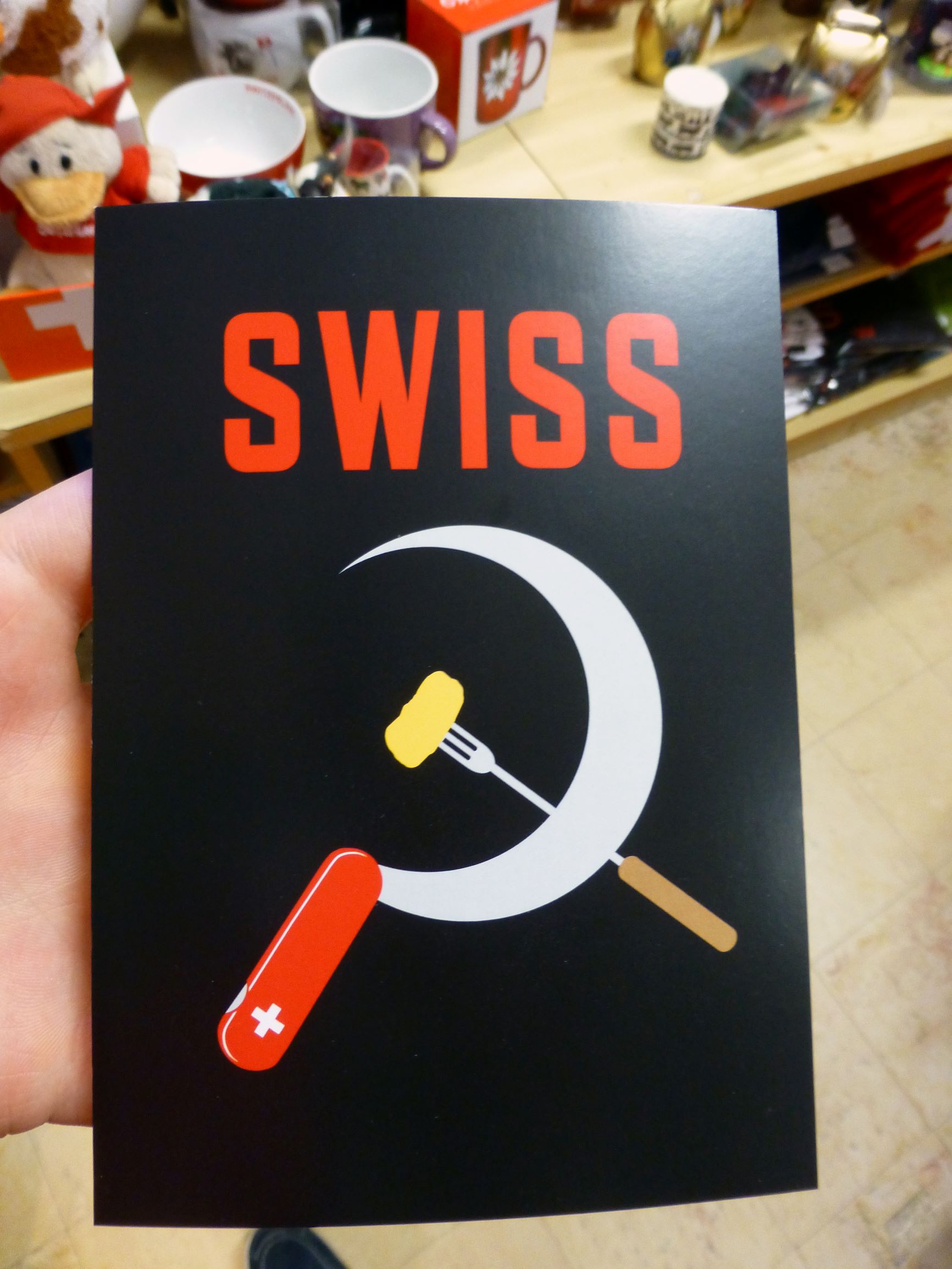
Visiting any country it is important not to confuse tourism with emigration.In previous articles ( part 1 , part 2 , part 3 ) we touched on a professional topic that awaits a young and still green university graduate upon admission, as well as while studying in Switzerland. The next part, which follows logically from the three previous ones, is to show and tell about everyday life, about bikes and myths that breed on the Internet, about Switzerland, and also affect the balance of expenses and incomes.
Popular wisdom
Disclaimer: Why did I even start writing this article? On Habré there is actually a lot of “success story” about how to leave, but very little about the reality that the emigrant will have to face upon arrival. One of the few examples that I liked, even if the author looks at the world through pinkish glasses, IMHO. Yes, you can find something similar in the vastness of Google documents, which is occasionally updated, with scattered advice, but this does not give a complete picture. So let's try to describe it!
All that is described below is an attempt to reflect on the surrounding reality, that is, in this article I would like to focus on my own feelings about the path traveled and share my observations. I hope that this will push someone to move to Switzerland, and someone to make their own little Switzerland at least in a separate yard.
')
So let's get everything in order, make yourself comfortable, longrid will be.
Obviously, there is a lot of traffic under the cut (~ 20 MB)!
Well-known facts about obscure Switzerland
Fact # 1: Switzerland is primarily a confederation
In other words, the degree of independence of individual cantons is quite high. Approximately, as in the USA, where each state has its own taxes, its own judicial systems, and so on, which are united by some general rules.
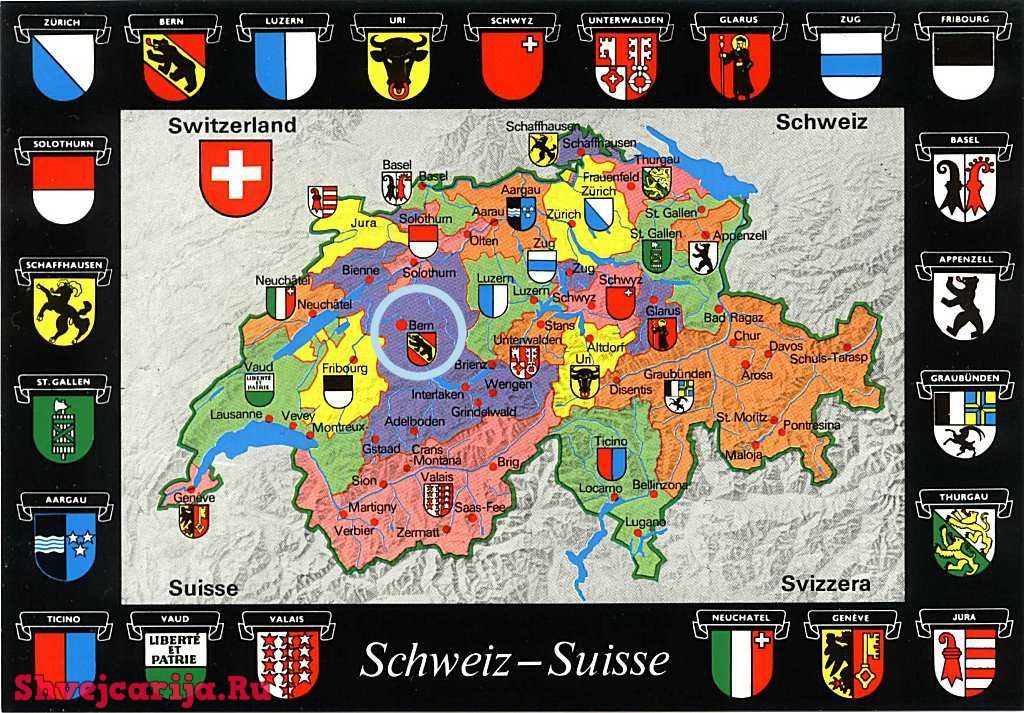
"Political" map of Switzerland. A source
Of course, there are fat cantons - Geneva (banks), Vaud (EPFL + tourism), Zurich (large IT companies), Basel (Roche and Novartis), Bern (this is the largest and most developed), and there is some Appenzell Inner Roden which is hard to find on the map either, or Vale, whose inhabitants are often dismissive (a lot of bushmen, politically correct “children from closely related ties” and generally confederation they entered after the defeat of Napoleon’s army in 1815 ).
Fact №2: Switzerland - the country of the Soviets.
Switzerland is essentially governed by councils, as I wrote on the 100th anniversary of the Revolution. Yes, yes, you heard right, the French word Conseil (council) and the German Beratung (this advice, instruction) are essentially those very councils of people's deputies of the dawn "October, Socialist, Yours!".
NB for bores: yes, I understand perfectly well that perhaps this is a dragging of an owl on a globe and post-knowledge, however, the Council and Conseil coincide in their goals and objectives, namely, to allow ordinary citizens to the basics of management of their district, city, country and ensure the turnover of power .
These councils are of several levels: Council of a district or “village” - Conseil de Commune or Gemeinde, as they call it for restigraben , Council of the city - Conseil de Ville, Council of Canton - Conseil d'Etat), Council of Cantons - Conseil des Etats, Council Federal - Conseil Federal Suisse . The latter is actually the federal government. In general, all around tips. This state of affairs was enshrined in the Constitution as early as 1848 (that's right, Lenin at that time was small and with a curly head!).
L'Union soviétique or L'Union des Conseils?
For me it was like a bolt from the clear November sky after 5 years of living in Switzerland. Somehow unexpectedly in the head came together in 1848, the first arrival of the “nobleman” Ulyanov aka Lenin in 1895 to Switzerland, i.e. half a century after the formation of the Soviet system, and the "Soviets" aka Conseils. But after all, Lenin lived in Switzerland for another 5 years from 1905 to 1907 (after the creation of the first Council of Workers' Deputies in Alapayevsk ) and from 1916 to 1917. Thus, Ilyich had enough time (and then for 5 years it was hoo-h what term!) not only for revolutionary activities, but also for the study of the local political system.
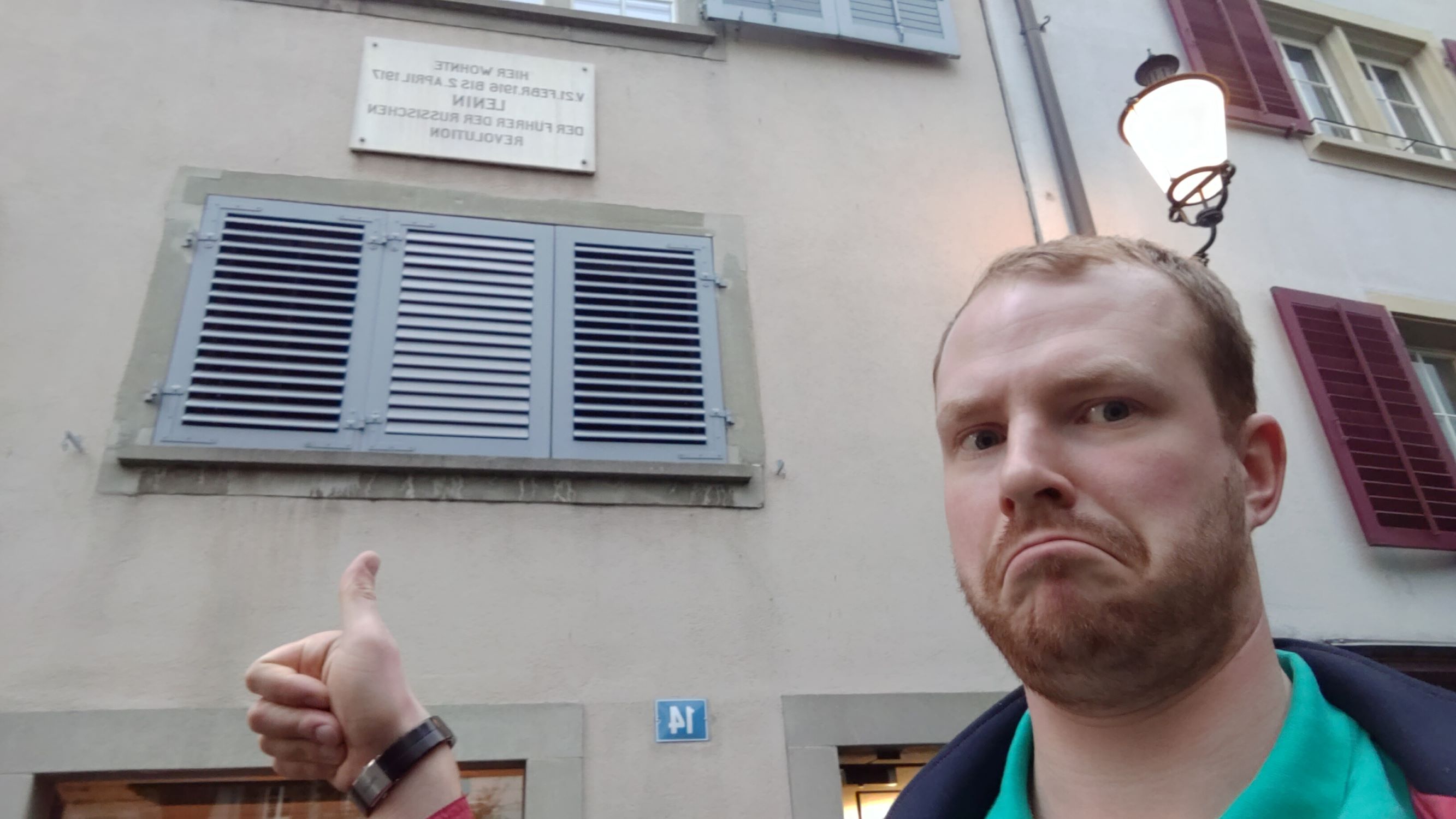
Führer Memorial Tablet in Zurich
We will not speculate on whether Lenin brought any other revolutionary “Soviets” to Russia or they originated distinctively, but this system of councils turned out to be quite effective and after the October Revolution, the field of “fragments of autocracy” was deployed on the nepahan, including ordinary people: peasants , sailors, workers and soldiers.
A couple of years after the country of the Soviets in 1922, the state of the USSR appeared on the map, which, oddly enough, was also a Confederation, and the Union republics so willingly used the article about secession from the Soviet Union in the 90s. So, when next time you see the mention of L'Union soviétique (after all, French is the language of international diplomacy even today) or the Soviet Union, think about whether it was the Soviet, or maybe L'Union des Conceils ?!

Führer Memorial Tablet in Zurich
We will not speculate on whether Lenin brought any other revolutionary “Soviets” to Russia or they originated distinctively, but this system of councils turned out to be quite effective and after the October Revolution, the field of “fragments of autocracy” was deployed on the nepahan, including ordinary people: peasants , sailors, workers and soldiers.
A couple of years after the country of the Soviets in 1922, the state of the USSR appeared on the map, which, oddly enough, was also a Confederation, and the Union republics so willingly used the article about secession from the Soviet Union in the 90s. So, when next time you see the mention of L'Union soviétique (after all, French is the language of international diplomacy even today) or the Soviet Union, think about whether it was the Soviet, or maybe L'Union des Conceils ?!
The meaning of all these councils is to give the entire population of the Confederation the right to participate in the political life of the country and, in fact, direct democracy. Thus, politicians often have to combine regular work with a role in local self-government, that is, in any Council.
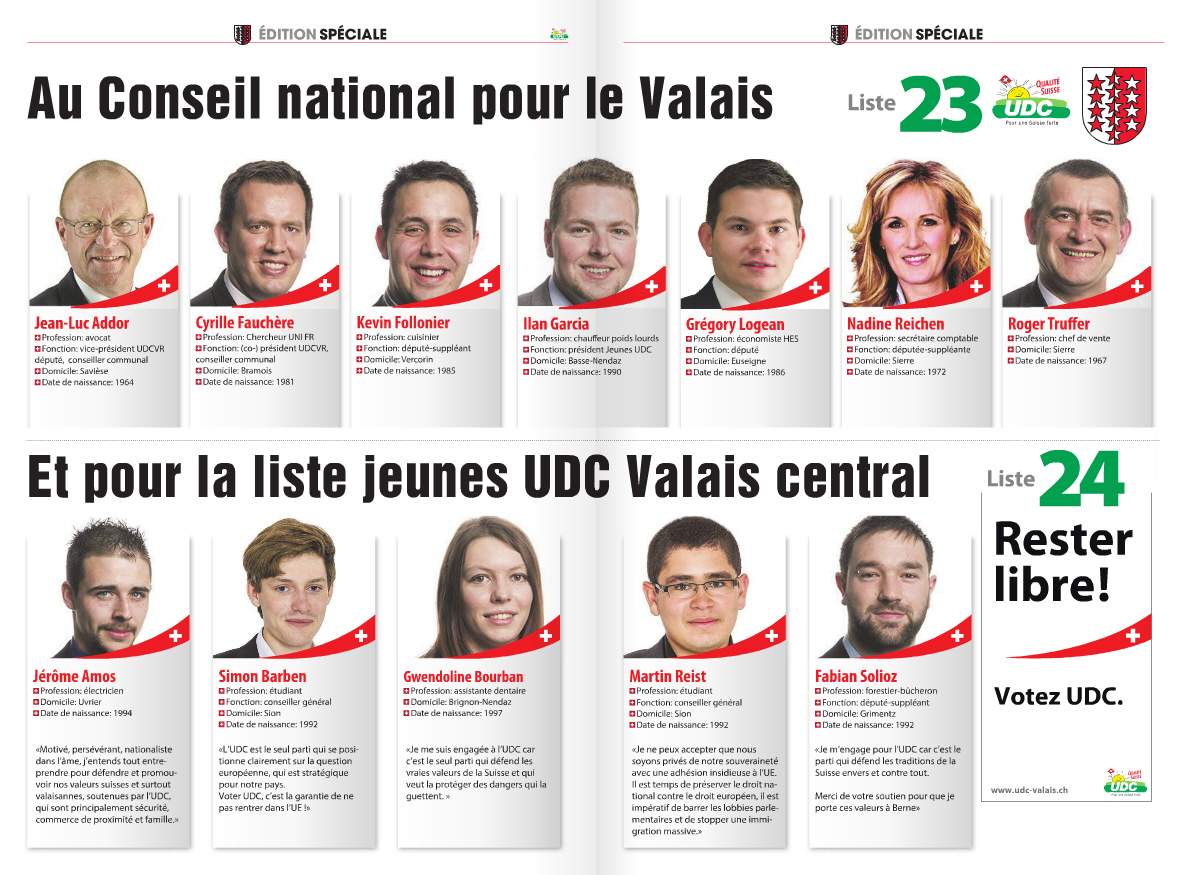
Here is one example of a candidate: a cook (cusinier), a chauffeur, a dentist and an electrician are available. A source
I am impressed that the Swiss are responsible not only for their “yard”, but also consciously participate in the life of the village and the city, have some kind of innate and / or educated sense of responsibility.
Fact # 3: The Swiss political system is unique.
From fact 2 it follows that Switzerland is one of the very few countries in the world where direct democracy is possible and effective. Yes, the Swiss are very fond of expressing their will for any reason - from whether to use artillery to launch avalanches to build houses of concrete or of a more ecological tree (in Switzerland there are plenty of raw materials, but they say it kills natural beauty, and in general: ugly, but with a “beautiful” tree strained).
The main thing here is that in the frenzy of advocating for universal and universal voting, remember that just over 8 million people live in Switzerland and organizing a vote on any issue is relatively not a troublesome task. Yes, and statistics to collect is simple - sent an email with a login password to log in and ready.

So roughly looks system for collecting statistics. To vote, you have to go to the polls yourself, but only citizens have the right to vote.
By the way, it is very convenient and allows you to generate convenient statistics every year. For example, demographic data for the last 150 years of Swiss history in a single file .
Fact 4: Military service in Switzerland is obligatory.
However, the service itself is not to pull the strap, continuously giving the debt to the Motherland from the fence to sunset, but rather an obligatory health camp for men up to 45 years old inclusive. Truly, the first 40 years of childhood are the most difficult in the life of a man! Even the employer has no right to refuse, if the employee is called for fees, and the elapsed time (1-2 weeks is usually) will be paid in full.
Why a health camp? Soldiers for the weekend go home, work strictly on the clock. For example, when once in the early morning they hijacked a plane in neighboring Italy and sent it to Geneva, then, by coincidence (the working day from 8 am to 6 pm and a break from 12 to 13), the Swiss army did not escort it with an escort .
There is a rather persistent myth that all Swiss are given weapons home after serving in the army. Not everyone, but only those who want and do not give (that is, for free), but they buy it at minimum prices, while there are requirements for storage, and not just under the bed. By the way, then from this weapon you can shoot in the dash, if there are familiar servicemen.
The latest referendum (see fact number 3) will oblige the federal government to introduce European standards for handling weapons, that is, in fact, will tighten the possession of them.
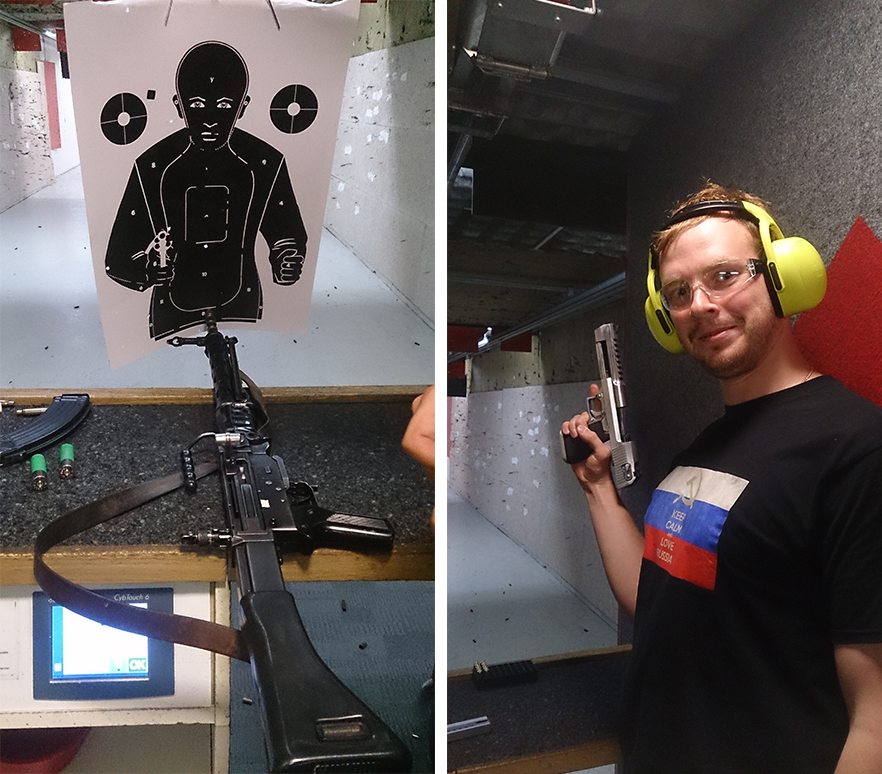
Left: Swiss Army rifle SIG Sturmgewehr 57 (slaughter power), right: content from shooting from B-1-4 (if you know what I mean) aka Desert Eagle
Fact # 5: Switzerland is not just cheese, chocolate, knives and watches.
Many at the word Switzerland recall cheese (Gruyere, Ementaller or Tilsiter), chocolate (usually Tobleron, because it is sold in each duty free), an army knife and fabulously expensive watches.
If you are thinking of buying a Swatch watch (there are such brands as Tissot, Balmain, Hamilton, etc.), then up to 1,000 francs almost all watches are made on the same manufactories and the filling of all watches is about the same. Only starting from the upper range (Rado, Longines) appear at least some "chips".
In fact, in Switzerland, a world order has been adopted that technologies are created and developed inside the country, which are then exported from the country, because the country is poor in resources. The most famous examples are Nestlé dry milk (Nestlé) and Oerlikon rifled stems, which were used to equip the Wehrmacht and the Kriegsmarine during the second world war. At the same time, the country has its own production of microelectronics (ABB - power, EM Microelectronic - RFID, smart cards, filling smart watches, and so on according to the nomenclature list of goods), its production of complex components and assemblies, its own train assembly (two-story Bombardier , for example, collected under Villeneuve) and further down the list. And about the fact that a good half of pharma is sitting in Switzerland - I tactfully keep silence (Lonza in the new cluster in the Sierre, Roche and Novartis in Basel (Basel) and the district, DeBioPharm in Lausanne and Martin and (Martigny) and A lot of startups and smaller companies).
Fact №6: Switzerland - a kaleidoscope of climates
Switzerland has its own Siberia with temperatures down to -30 C, it has its own Sochi (Montreux, Montreux), where rickety palm trees grow beautifully and herds of swans graze, there are their own “deserts” (Valais), where the air humidity lasts from 10 to 30 all year round. %, and the number of sunny days per year passes for 320, and there is also St. Petersburg, like Geneva (with freezing rain and the “water” metro ) or Zurich.
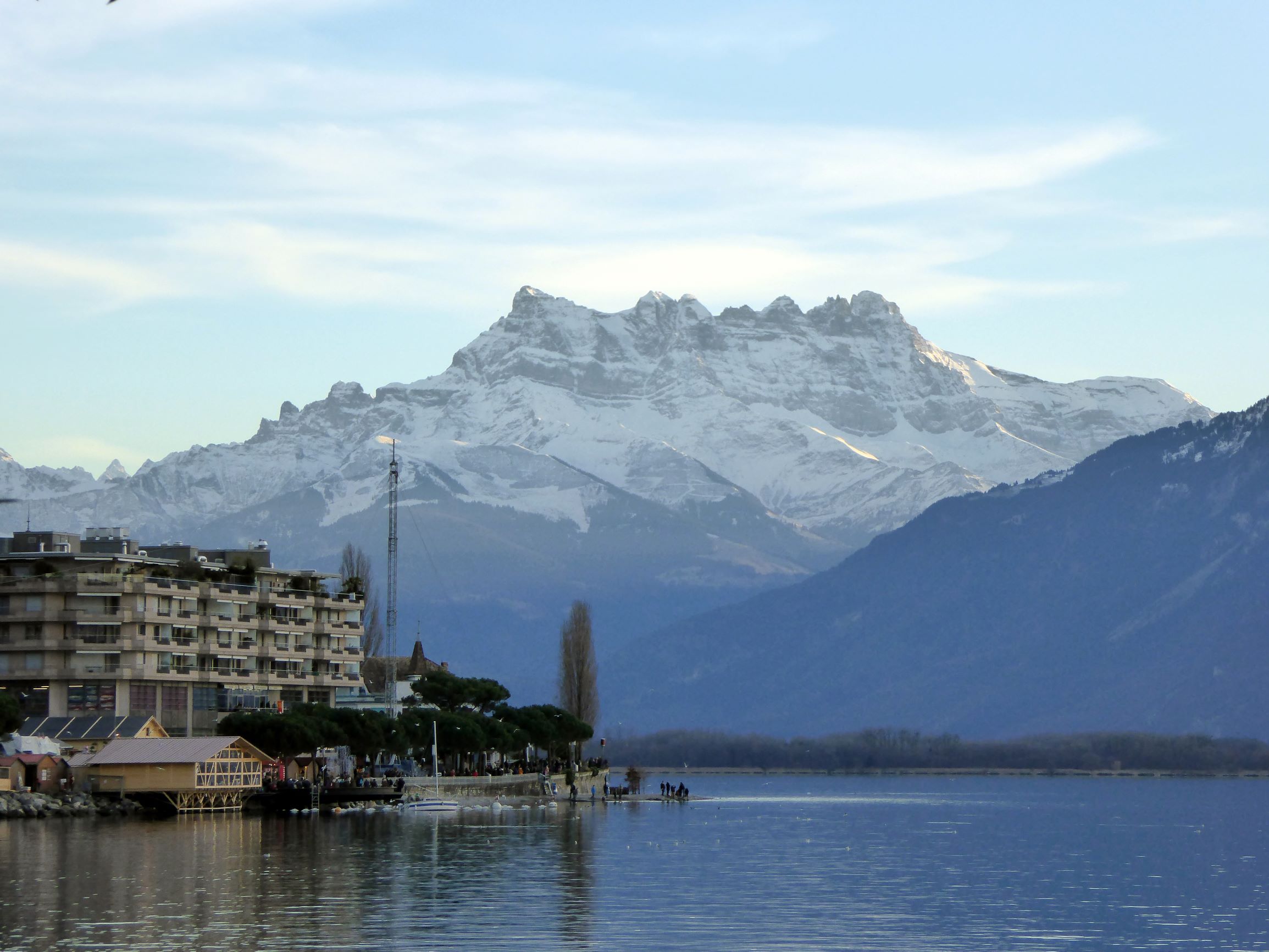
Waiting for the new year: Montreux is still relatively warm, and there is already snow in the mountains
Amusingly, Switzerland is famous for its ski resorts, however, in most cities there is not much snow, respectively, often the snow is not removed, and the road is cleared for cars and pedestrians - they are waiting for it to melt. Autobahns, of course, have to be cleaned first, but only with the start of the working day. Now imagine a million-plus million, like Zurich, during such apocalypses ...
An example is the snowfall in Zion in December 2017 - a complete collapse. Even the platform at the train station was cleaned for several days. Zion was not lucky twice in 2017-2018 - at first it was covered with snow in winter , and then drowned in summer. We even laboratory suffered. And I ask you to note, no Sobyanin.
In Switzerland, everything works like an accurate clock, but when it comes to snow, it turns into Italy. (c) - my boss.
And according to this, every home has a person in charge who is responsible for cleaning the local area, usually a concierge, there is a simple cleaning technique (for example ). In the villages, residents with large cars have a special blade for this. Everything is cleaned to asphalt or tile, otherwise it will melt during the day, and freeze at night. What prevents Russia from collecting and bringing their own yards in order, or buying a small combine (~ 30k rubles) for these purposes - remains a mystery to me.
The history of one parking in Russia
It so happened that about 8 years ago I had a car, I loved it and drove a shovel in it, which I dug out my parking lots with. So for 1 day in my far from poor courtyard (SUVs from Mazda and Tuareg - the norm), I dug out 4 parking spaces in one light day.
Just as in a relationship, everything is determined not by who, to whom and what should, but by what you yourself have done for convenience and general welfare. Need to start with yourself! And the Tuareg both roll themselves a rut in the yard and in the parking lot ...
Just as in a relationship, everything is determined not by who, to whom and what should, but by what you yourself have done for convenience and general welfare. Need to start with yourself! And the Tuareg both roll themselves a rut in the yard and in the parking lot ...
Fact №7: Polite "politeness"
Tell me honestly, when was the last time the “good afternoon” and “thank you” were told to the service personnel? And in Switzerland it is the same habit as breathing in and out, intensifying in small villages. For example, here almost everyone will have to say bonjour / guten Tag / buongiorno (good afternoon) at the beginning of the conversation, merci / Danke / gracie (thank you) after some service and bonne journée / Tschüss / ciao (good day) saying goodbye. And even in haikas, everyone you meet will greet you - amazing!
And this is not an American “hawaii”, when a person somewhere in his bosom holds an ax to slash as soon as he turns away. In Switzerland, since the country is small and until recently with a significant “village” population, everyone greets, albeit on automatism, but more sincerely than in the USA.
However, one should not be misled about the hospitality and kindness of the Swiss. Let me remind you that in the country there are some of the most stringent laws on naturalization, which include working life, and knowledge of the language, and exams. Good outside, a little nationalists inside.
Fact # 8: The Swiss Village is Alive
Surprisingly, but a fact: in Switzerland, the village is not only not dying out, but is also quite tolerably developing and expanding. The point here is not in ecology and green lawns, on which goats and cows are jumping, but purely economic. Since Switzerland is a confederation, taxes (in particular, NDFL) are paid at 3 levels: communal (village / city), cantonal (“region”) and federal. The federal one is for everyone, but “manipulations” - in the good sense of the word - with the other two, can significantly reduce taxes if the family lives in the “village”.
We will talk about taxes in detail in the next part, but for now I’ll note that if for Lausanne, that is, a person lives in a city, the conditional tax burden is ~ 25% per person, then for some god-forgotten village in the same canton of Vaud, for example, Mollie-Margot it will be ~ 15-17%. It is clear that not all this difference can be put in your pocket, as you will have to keep the house yourself, mow the lawn, pay for the car and drive to work in the city, but housing prices are lower, farm food, and the freedom of the children to run around the meadows.
And yes, there is a very strange attitude to marriage. Sometimes taxes on a family without children can significantly exceed the tax on one physical person, so the Swiss are not in such a hurry to flee to the local registry office. For the economy must be economical. Even a referendum on this issue was carried out. But about taxes in the next part.
Transportation system
In general, in Switzerland it is convenient to move both by car and by public transport. Often travel time is comparable.
Trains and public transport
Strange as it may seem, but for such a small country as Switzerland (almost 2 times smaller than the Tver region and comparable to Moscow), the railway transport network is simply enormous. Add to this the PostAuto buses, which not only make it possible to move between remote villages, but also deliver the mail itself. Thus, you can get from almost anywhere in the country to any other.
Swiss trains are the most train trains in the world, especially double-decker
To plan your route, it is enough to indicate the departure and destination stations in the SBB application. A couple of years ago, it was significantly updated, the functionality was expanded, and it became just a great helper in traveling around the country.
A few words about the history of SBB
Once upon a time there were many private companies in Switzerland that built, exploited and controlled the movement of passengers and goods between cities. However, the orgy of capitalism (somewhere they could not agree among themselves, somewhere they overestimated tariffs, and so on) ended at the beginning of the 19th century with the creation of a common state coordinating center - the SBB, which rather quickly freed “effective owners” from many problems and headaches. , nationalizing all railway carriers.
Now the remnants of the former “luxury” can be observed in the abundance of “subsidiary” companies that are engaged in transportation (MOB, BLS, and so on) and which even paint trains in different colors. However, they are engaged only in local transportation, but globally everyone steers SBB.
Immediately I want to draw a parallel: SBB is an analogue of the Russian Railways, but this is not quite the case. SBB is a “super-brainer” created to curb and manage individual regional carriers, while Russian Railways has a very complex structure, where the cars are used alone, the contact networks are different, and the canvas is still the third. From here, in my opinion, and problems of our railway message.
Now the remnants of the former “luxury” can be observed in the abundance of “subsidiary” companies that are engaged in transportation (MOB, BLS, and so on) and which even paint trains in different colors. However, they are engaged only in local transportation, but globally everyone steers SBB.
Immediately I want to draw a parallel: SBB is an analogue of the Russian Railways, but this is not quite the case. SBB is a “super-brainer” created to curb and manage individual regional carriers, while Russian Railways has a very complex structure, where the cars are used alone, the contact networks are different, and the canvas is still the third. From here, in my opinion, and problems of our railway message.
Transportation in Switzerland is fabulously expensive. If you buy tickets just in the machine without special tricks, you can stay without pants in the truest sense of the word! For example, a ticket from Lausanne to Zurich will cost about 75 francs in the second class in one direction in 2 hours, so almost the entire population of Switzerland has season tickets (AG, regional passes, demi-tariff and so on). Friends working at SBB say that the number of different types of tickets reaches thousands! Together with the SBB application, a universal RFID card was introduced - Swisspass , which is not only an electronic form of travel cards, but you can throw off a regular ticket or a ticket for a ski lift. All in all, very comfortable!
Hypothesis about the cost of tickets or what has the demi-tariff
IMHO, SBB makes the knight's move: it calculates the break-even cost of tickets, adds its 10%, and then multiplies by 2, so that people buy this demi-tariff card for 180 francs a year. Let 1 million of such cards be sold annually (population ~ 8 million), for someone rides regional passes, someone for AG. Total we have 180 million francs on level ground.
This scenario is also supported by the fact that in 2017, SBB earned 400 million francs more than the plan , which was distributed to the owners of various SBB cards in the form of bonuses, as well as allowed to reduce the cost of tickets off-peak hours.
This scenario is also supported by the fact that in 2017, SBB earned 400 million francs more than the plan , which was distributed to the owners of various SBB cards in the form of bonuses, as well as allowed to reduce the cost of tickets off-peak hours.
For teenagers, various discount programs are provided, for example, Voie 7 or Gleis 7 - up to 25 years (renewals must be submitted 1 day before the date of birth), you can order this card for ~ 150-170 in addition to the demi-tariff card. It gives the right to travel on all trains (buses, ships and public transport are not included) after 7 pm (yes, 19 is zero-zero , Karl! 18-59 - does not count!). The perfect way for a student to travel around the country.
However, while the article was being written, they managed to cancel this card and introduce another one, Seven25, the cost of which has increased significantly.
In addition, the SBB distributes the so-called day tickets (carte journaliere) to the communes aka cities and villages. Each resident of a commune is entitled to several such tickets during the year. The cost, quantity and possibility of purchase for each commune are their own and depend on the number of inhabitants.
Examples of carte journaliere and how to get
In the commune of Geneve (large city) 20-30 tickets will be available every day, but their cost is 45 CHF, which is quite expensive.
In the municipality of Préverenges (hamlet) such tickets will be 1-2 per day, but they will cost 30-35 francs.
Also, the requirements for documents for the purchase of these vary from a commune to a commune: somewhere just ID is enough, and somewhere it is necessary to confirm the fact of residence at the address, for example, to bring the bill from the utility or for the phone.
In the municipality of Préverenges (hamlet) such tickets will be 1-2 per day, but they will cost 30-35 francs.
Also, the requirements for documents for the purchase of these vary from a commune to a commune: somewhere just ID is enough, and somewhere it is necessary to confirm the fact of residence at the address, for example, to bring the bill from the utility or for the phone.
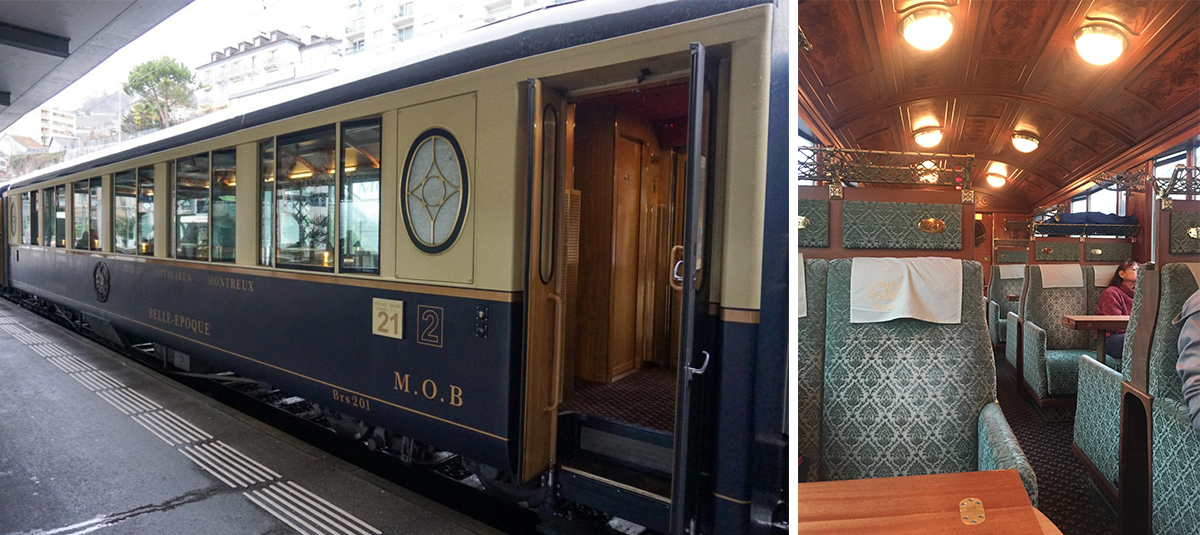
Belle époque train on the Golden Pass between Montreux and Lucerne
And yes, it is worth mentioning that all SBB travel passes, with rare exceptions, apply to water transport, which is abundant on every Swiss lake. So, for example, for a couple of years now we have been riding the lake of Geneva with cheese and wine on the luxury ships “Belle époque”.
Note for lovers of conspiracy (about Huawei)
Of course, to check tickets, you need a reader. The most universal reader - NFC in the smartphone. A couple of years ago, all the conductors on the train used to go with Samsung smartphones, they said that they braked wildly and sometimes just hung up, but for the driver, it’s like death — neither the schedule to look, nor help those in need with transfers. As a result, changed to Huawei - everything works fine, does not slow down, if you know what I mean ...
And even without 5G networks ...
And even without 5G networks ...
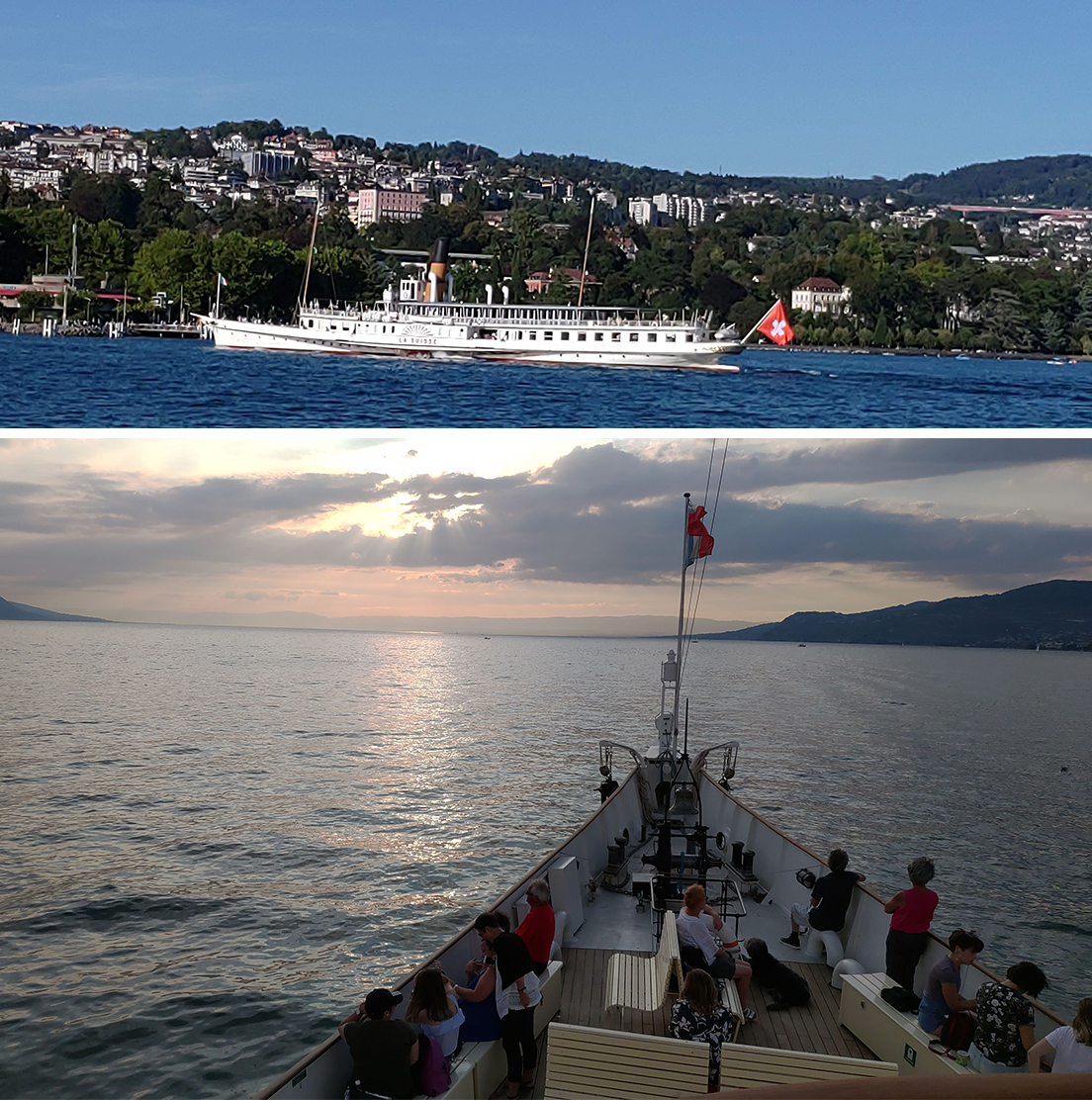
The ship "Belle époque" between Montreux and Lausanne
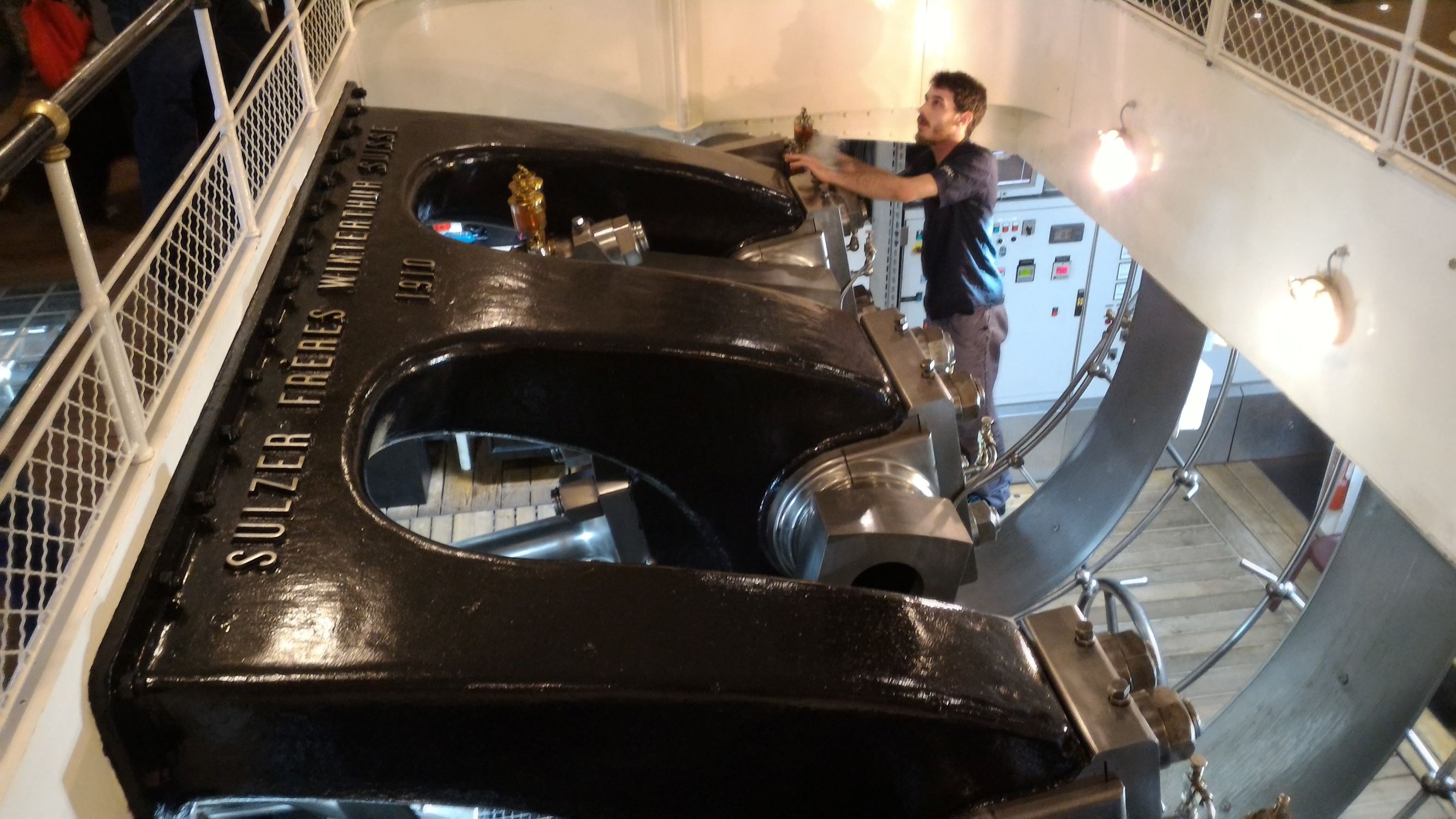
Some ships have a steam engine preserved!
Although the SBB is developing at an incredible pace (new infrastructure, digitalization, including the scoreboard - soon there will be almost no old ones turning over, a new two-story train in Valais, and so on), a noticeable anachronism persists, and the ultra-modern may well adjoin the ultramodern. For example, special trains for fans, fans come from the 70s with “gravity-type toilets” (c). Even some trains Zurich - Chur (Chur) (IC3) are such that we can talk about the train to Davos, where some of the cars are old and some are ultramodern.
SBB tricks and life hacks for attentive readers
- If you are traveling in Switzerland second class and you need to work or just a lot of people and want to “breathe” - just sit in the dining car, order beer or coffee for 6 francs and enjoy the comfort. Unfortunately, only on IC lines, and not all. Actually, part of this article was written in such restaurants.
- SBB has a Snow & Rail program when you can buy both a ticket and a skipass at a reduced price. In principle, until recently it worked with various travel cards, for example, AG. In fact, -10-15% of the price of the pass.
- On the GoldenPass (MOB) road, there are three kinds of carriages: regular, panoramic and Belle époque. It is best to choose the last two or just Belle époque.
- Through the SBB application is very convenient to buy tickets. , . , , .
Machine vs public transport
The question is burning and there is probably no simple answer to it. In terms of value, owning cars is somewhat more expensive than 3,500 francs per year for second-class AGs; in addition, traffic jams often occur (for example, in winter everyone travels from Valais to Lausanne and Geneva, jams stretch for 20-30 km) or some cataclysms, as in Zermatt in the winter of 2017/2018 (due to the avalanche, the movement was completely paralyzed for about a week).
With the machine: pay for insurance (analogous to OSAGO, CASCO, TUV insurance, on which technical assistance arrives, etc.), throw some money on gasoline, any minor breakdown turns into a quest and a budget waste.
And yes, advice for travelers: driving into Switzerland, you must purchase a so-called vignette (~ 40 francs), which gives you the right to travel on high-speed highways during a calendar year — such a kind of road tax. If you enter through such a highway, then be prepared that you will be forced to buy a vignette right at the point of entry. Therefore, if you rented a car in France and decided to call for a day in Geneva, it is better to find a smaller road for crossing the border.
However, I would single out three categories where the answer is unequivocal:
- Students and students up to 25 years old, who for ~ 350 francs have two cards (demi-tariff and voie7) and can easily move between major cities.
- Single people who live and work in large cities. That is, they do not need to go to work and from work every single day from some deaf village, where the bus gets a couple of times in the morning and a couple of times in the evening.
- Married / married with children - at least one car per family is necessary.
On the other hand, my girlfriend in Geneva got a car because she travels around the city center by public transport with a lot of time, and it’s easier to get to work in 15 minutes by the ring road.
And more recently, cyclists, scooters and bikers are becoming more and more on the roads. This is due to the fact that parking for scooters / motorcycles is usually free and really scattered around the city.
Leisure and entertainment
What is to entertain yourself in such hectic, but free time from work? What is the situation with leisure?
Cultural program: theaters, museums, concerts and cinema
Let's start with the main thing - the dialectic of cultural life in Switzerland. On the one hand, the country is located in the physical center of Europe at the crossroads of routes from Italy to Germany and from France to Austria, that is, artists of all stripes and nationalities can call in. In addition, the Swiss are solvent: 50-100 francs for a ticket to the event - the standard price, how to go to a restaurant. On the other hand, the market itself is small - only 8 million inhabitants (~ 2-3 million potential customers). Therefore, in general, there are many cultural events, but often there are 1-2 concerts or performances in large cities (Geneva, Bern, Zurich, Basel) for the whole of Switzerland.
It follows that the Swiss love their "crafts", such as a concert for students Balelec, held in the EPFL, or all sorts of festivals (spring festival, St. Patrick's Day, etc.), in which parochial amateur performances (sometimes even quite virtuoso) participate.
Unfortunately, local cultural handicrafts such as theater, for example, of a very specific quality and quality, are an amateur and language connoisseur.
Sometimes there are events with Swiss specificity, such as organ music in the Cathedral of Lozana with thousands of lit candles. An event of this kind is either free, or the entrance ticket costs about 10-15 francs.
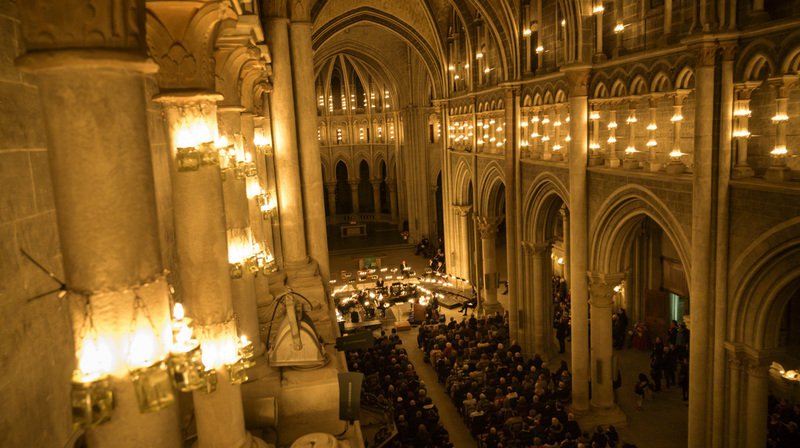
3700 candles, however. A source
Since the Swiss culture is the culture of peasants (tillers, shepherds) and various artisans, the events here are relevant. For example, the descent and ascent of livestock to the mountains, caves ouvertes (days of open cellars of winemakers) or the grand celebration of winemaking - Fête des Vignerons (the latter was somewhere in the early 90s, and now will be in July 2019).
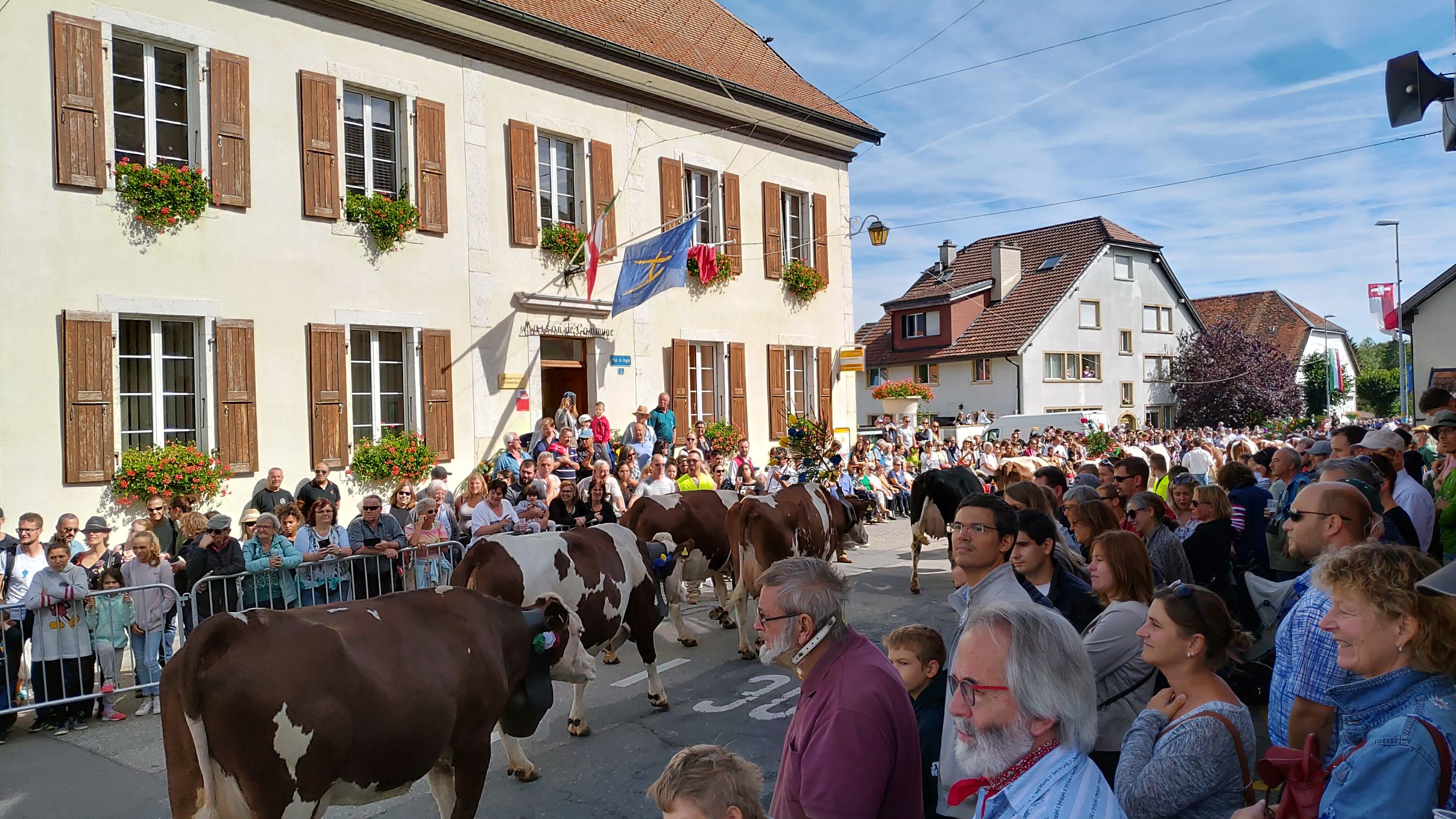
Autumn descent of cows from the mountains in the canton of Noschatel
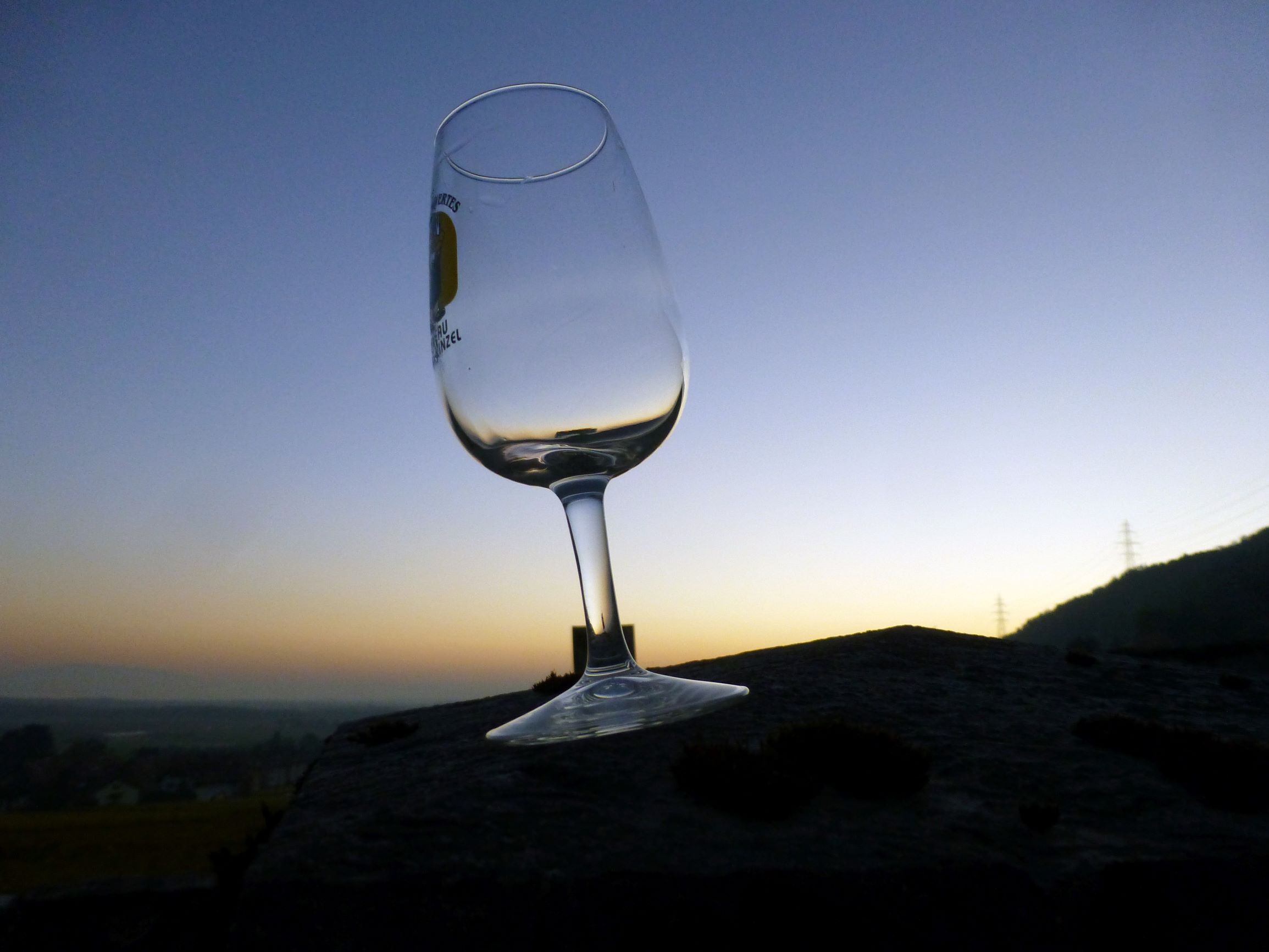
Sometimes such events end in deep night.
Museums are available, but the quality of these again leaves much to be desired. For example, the puppet museum in Basel can be bypassed in a couple of hours, while the ticket costs about 10 francs.
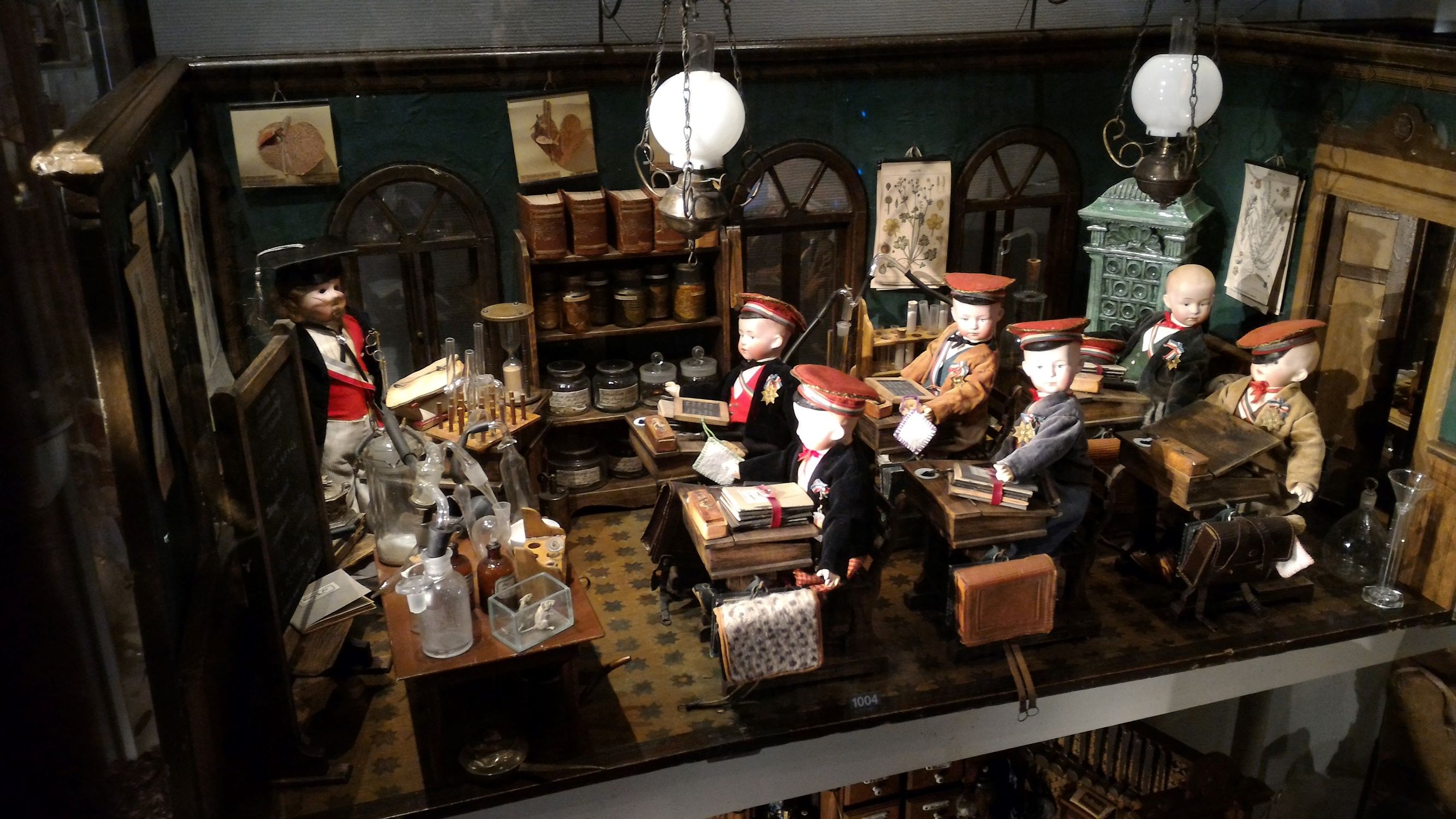
A class of young alchemists at the puppet museum in Basel.
And if you want to go to the Ryumin Palace and visit the mineralogical and zoological museums, the money museum, the canton history museum, and also admire the art museum, then you will have to pay 35 francs. In addition, the building has a library of the University of Lausanne, so you can estimate which Hermitage is waiting for you. Therefore, if this is a museum in the castle - you should not wait for tapestries of the 14th century, if the museum of coins - you should not wait for the collection of the Armory Chamber or the Diamond Fund, it is better to focus on the level of a small town museum.
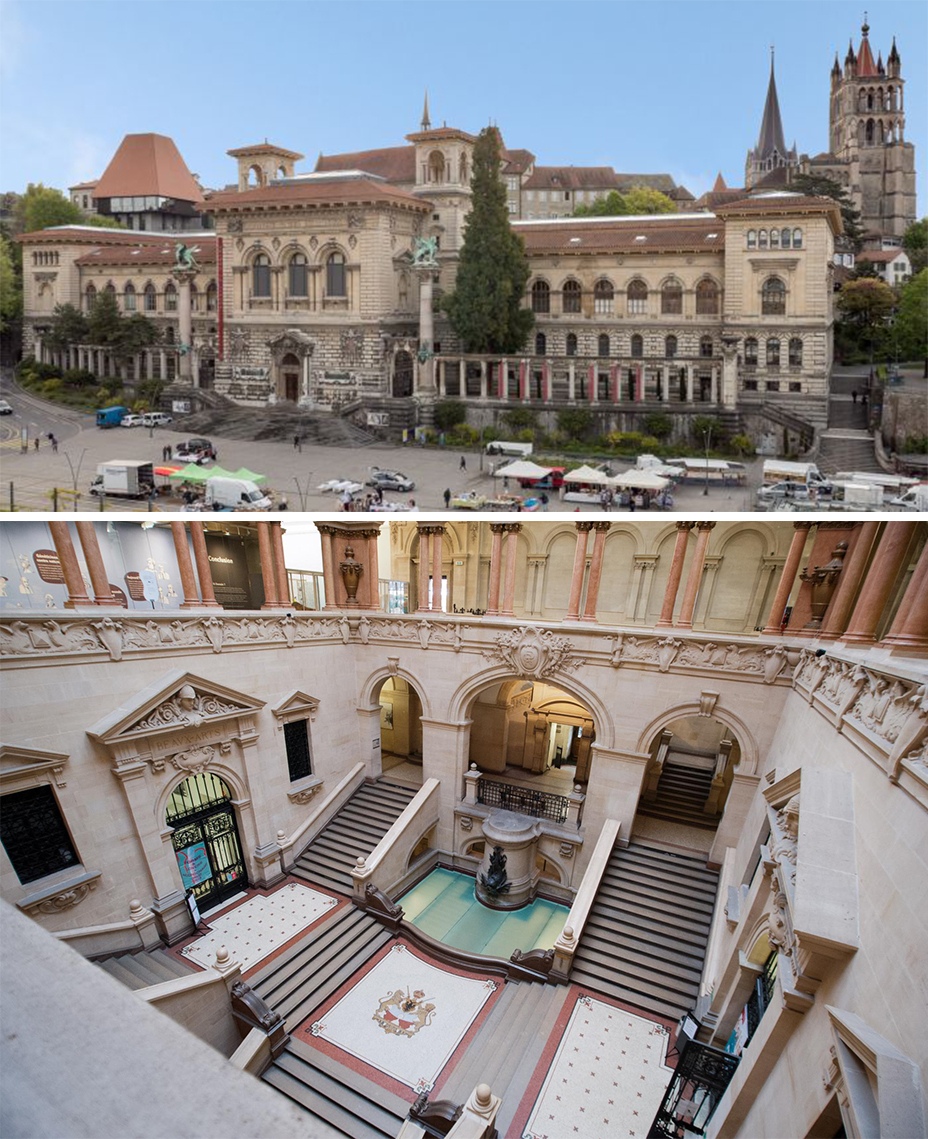
Palace Ryumin in Ripon Square in Lausanne. A source
Yes, Lausanne is officially called the Olympic capital, the IOC, various international federations and so on are located here, and accordingly, there is an Olympic museum where you can see how the torch has changed, for example, during the last century, or to ponder over the Bear 80.
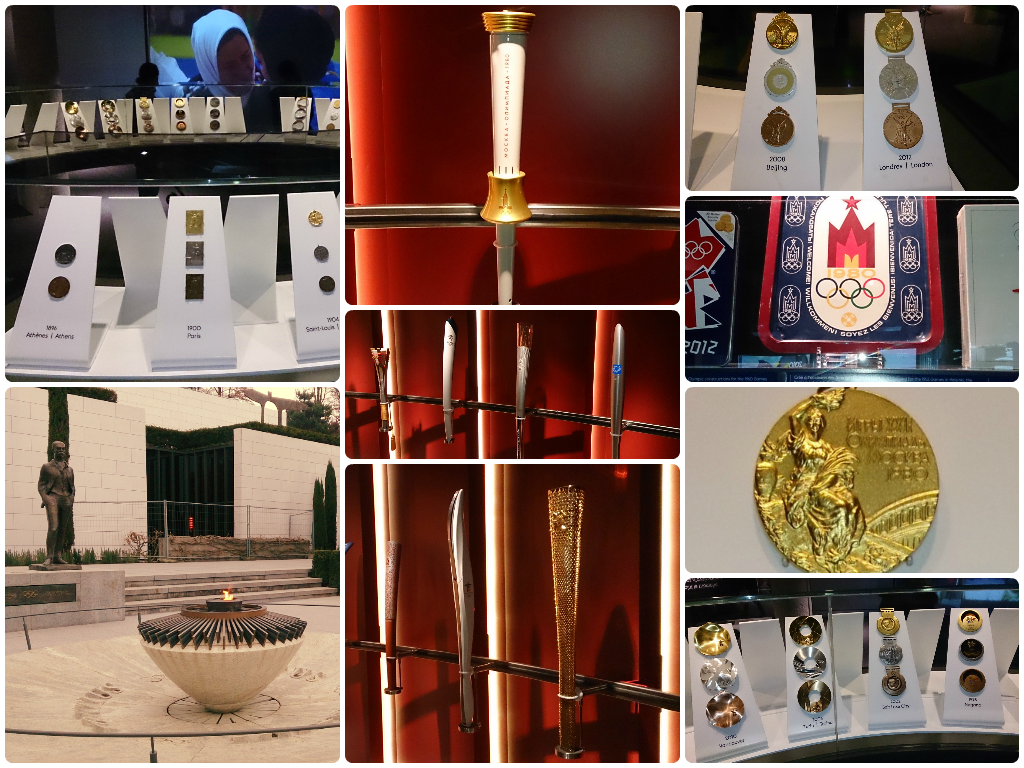
World Olympiad in Lausanne
Briefly about the movie. It is nice that the movies are often shown with original voice acting and subtitles in one of the official languages of Switzerland.
Russian community and events
By the way, recently they began to massively carry Russian artists and Russian films (at one time they brought Leviathan and the Fool with Russian voice acting). If my memory does not fail me, then the Russian ballet was brought to Geneva exactly.
In addition, the vast Russian community often organizes some of its events: these are games in “What? Where?When? ”, Mafia, and lecture halls (for example, Lemanika ), and events like“ The Immortal Regiment ”, organized by volunteers with the support of the consular department,“ Total Dictation ”and“ Soledskiy Prival ”by Russian Nights .
Plus, there are a lot of groups in FB and VK (sometimes with an audience of 10,000 people), in which the principle of self-organization works: I wanted to meet, cross, organize the event - I set the date and time. Who wanted - came. In general, for every taste and color.
Seasonal outdoor activities
Well, let's now see how in Switzerland you can entertain yourself seasonally apart from cultural raids.
The beginning of the year is winter. As I mentioned above, Switzerland is famous for its ski resorts, which are scattered around the Alps, a great many. There are very small 20-30 km of tracks, which is equivalent to one or two lifts, and there are giants several hundred kilometers with dozens of lifts, such as 4 valleys (including the popular Verbier ), Saas Valley (the most famous among them - Saas Fe ), Arosa or some Zermatt .
Usually, ski resorts open at the end of December and early January, depending on the amount of snow, so almost every weekend from January to the end of February are given for skiing, hiking on glaciers (snow shoeing), skiing on cheesecakes ( aka tubing) and other mountain-winter joys.
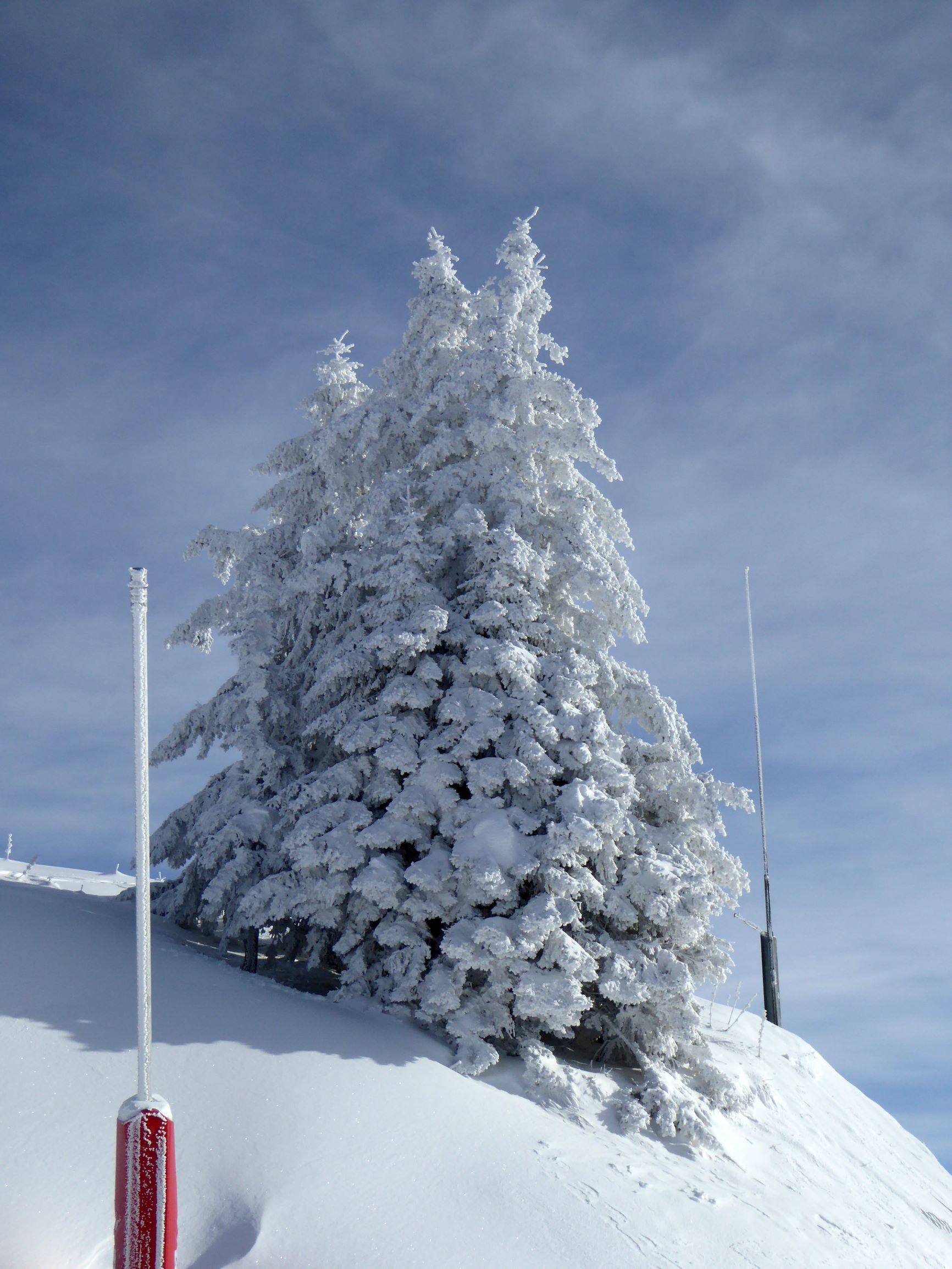
Villars-sur-Gryon immediately after a two-day snowfall.
By the way, no one has canceled ordinary cross-country skiing (there is a free or almost free track in almost every mountain village), as well as ice skating (there are in the mountains, and there are ice rinks in the cities themselves) .
The price tag for one day skiing ranges from 30 (small or difficult to access resorts) to almost a hundred francs (98, to be exact, for Zermatt with the ability to move to Italy). However, you can significantly save, if you buy passes in advance - two or three months, or even six months. Similarly with hotels (if you plan to stay in one valley for several days), which often need to be booked a few months before.
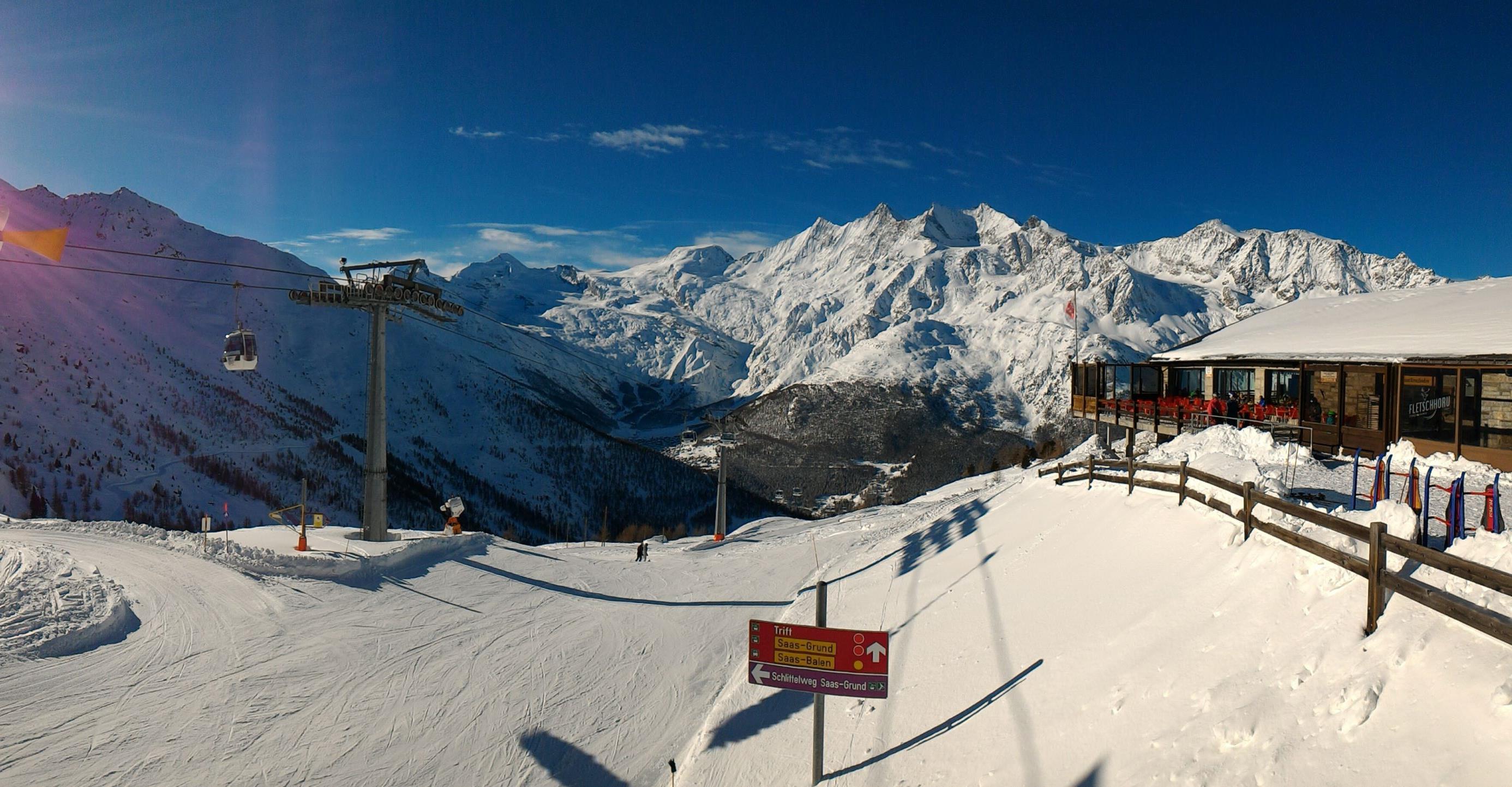
View of Saas-Fee from Saas-Grund
As for the rental of equipment, the set: for skiing - usually 50-70 francs per day, cross-country - about 20-30. That in itself is not so cheap, for example, in neighboring France, a set of ski equipment costs about 25-30 euros (~ 40 francs). Thus, the day of skiing, taking into account travel and food, can cost 100-150 francs. Therefore, having tried, skiers or bordists either rent equipment for the season (200-300 francs), or buy their own set (about 1000 francs).
Spring is a time of uncertainty. On the one hand, in March, in the mountains, alpine skis turn into water ones, it becomes too hot, and the ride is somehow not a high. Drink beer under a palm tree in a high - yes.
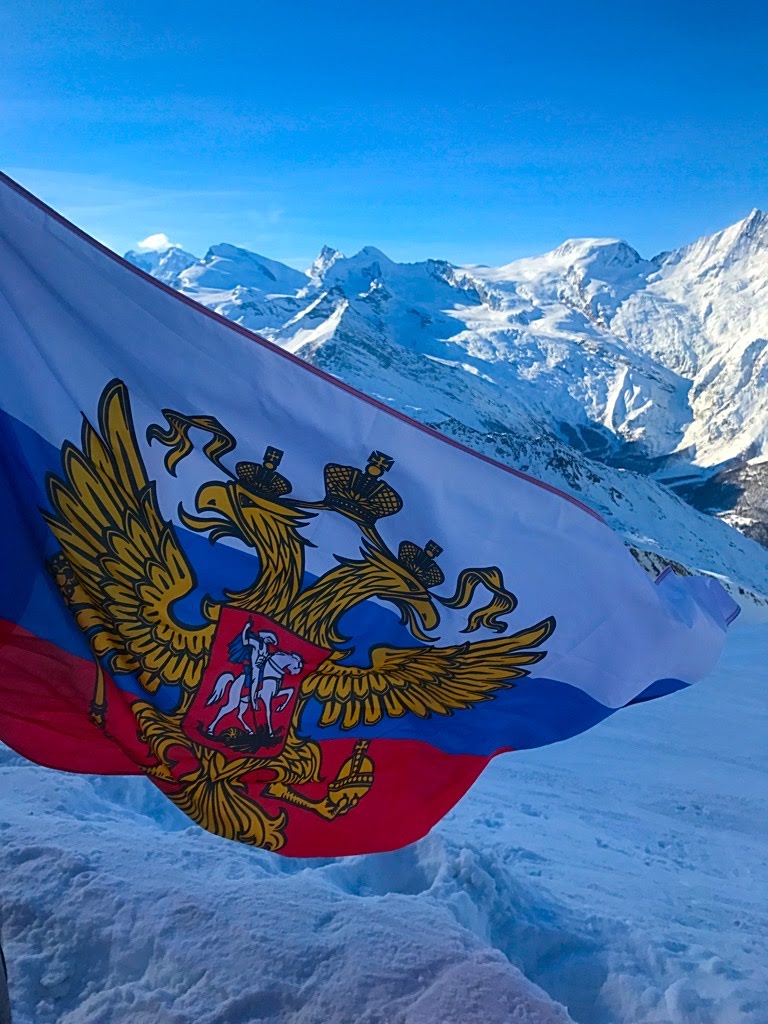
In April there is a wonderful Easter (4 days off), which many use to go somewhere on a trip. Often at the end of April it becomes so warm that the first marathons are held.
Yes, if you think that 10 or 20 km is nothing, the soul requires a swing, then you can try the Glacier3000 run . During this race, it is necessary not only to overcome the path of 26 km, but also to go up to 3000 meters above sea level. In 2018, women had a record - 2 hours and 46 minutes, for men - 2 hours and 26 minutes.
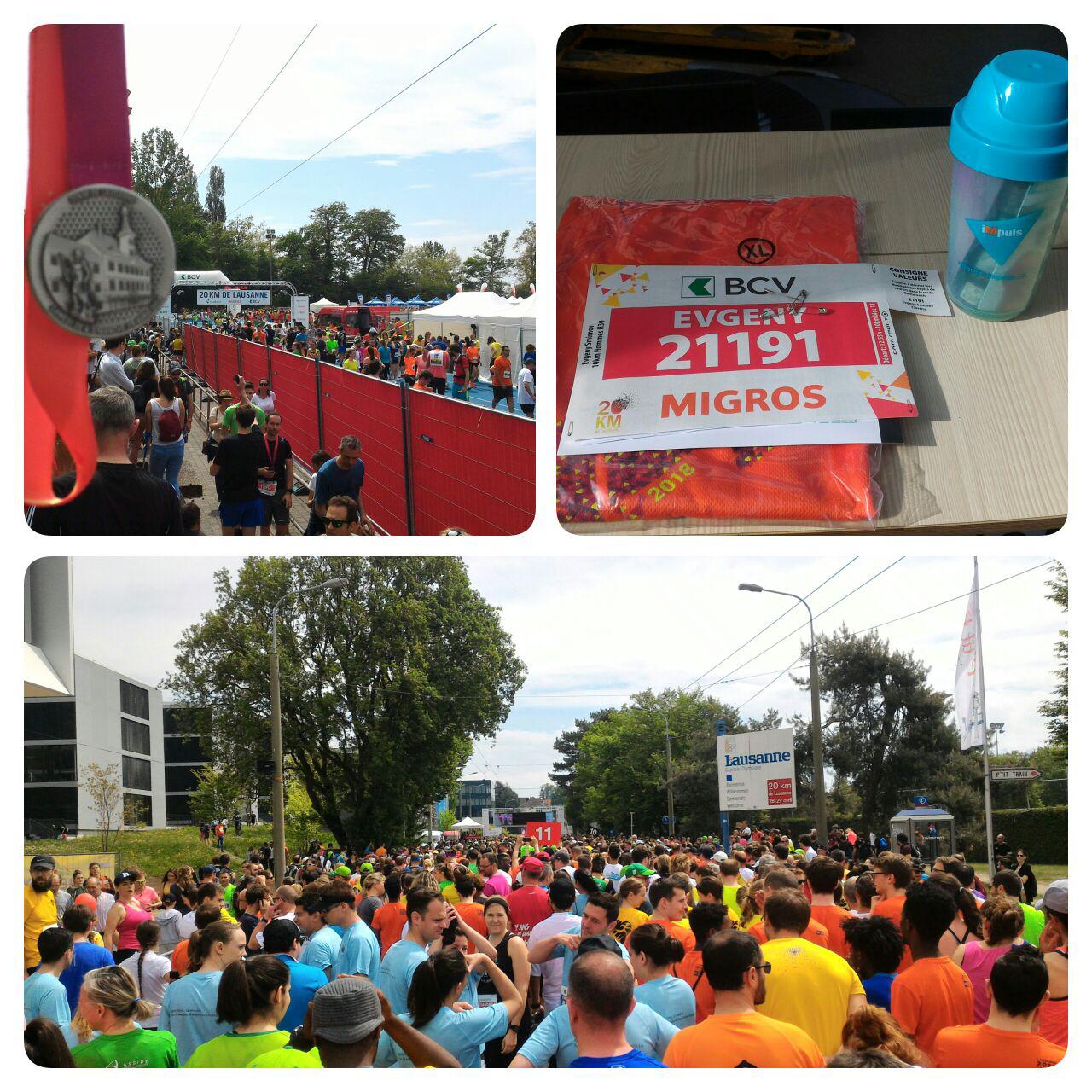
We run sometimes Lozanskiy 10 km
In May, the so-called caves ouvertes or days of open cellars begin, when, by paying 10-15-20 francs for a beautiful glass, you can walk between the wine producers (who keep it in those same "kava") and taste it. The most famous region is the vineyards of Lavaux (Lavaux) , which are protected by UNESCO. By the way, some distilleries are located at a respectable distance, so that between them you can take a nice walk.
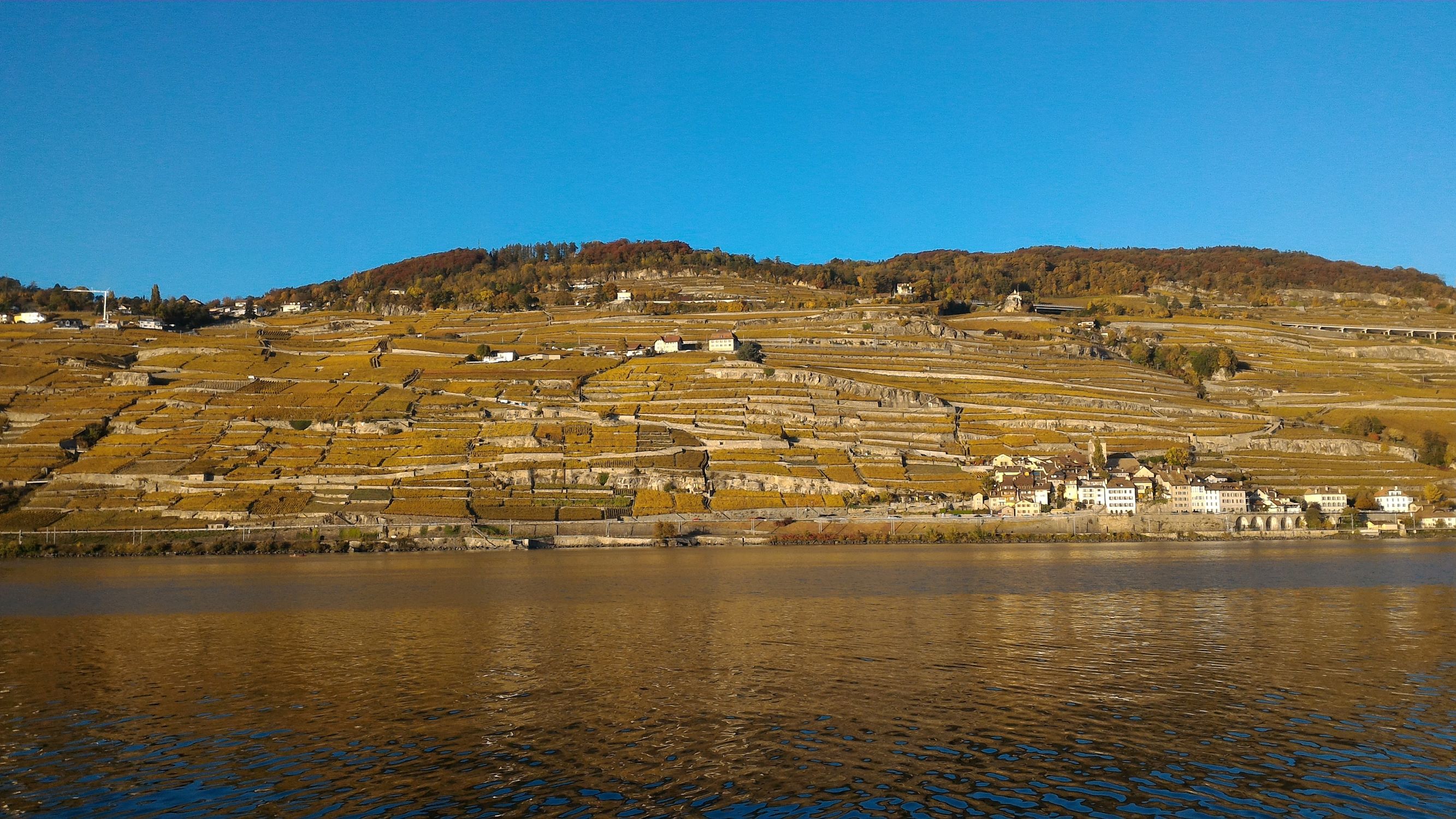
Those same vineyards Lavaux
In Ticino (the only Italian canton), they say, even bike tours are available. I don’t know how to count a bicycle, but at the end of the day it’s hard to stand upright.
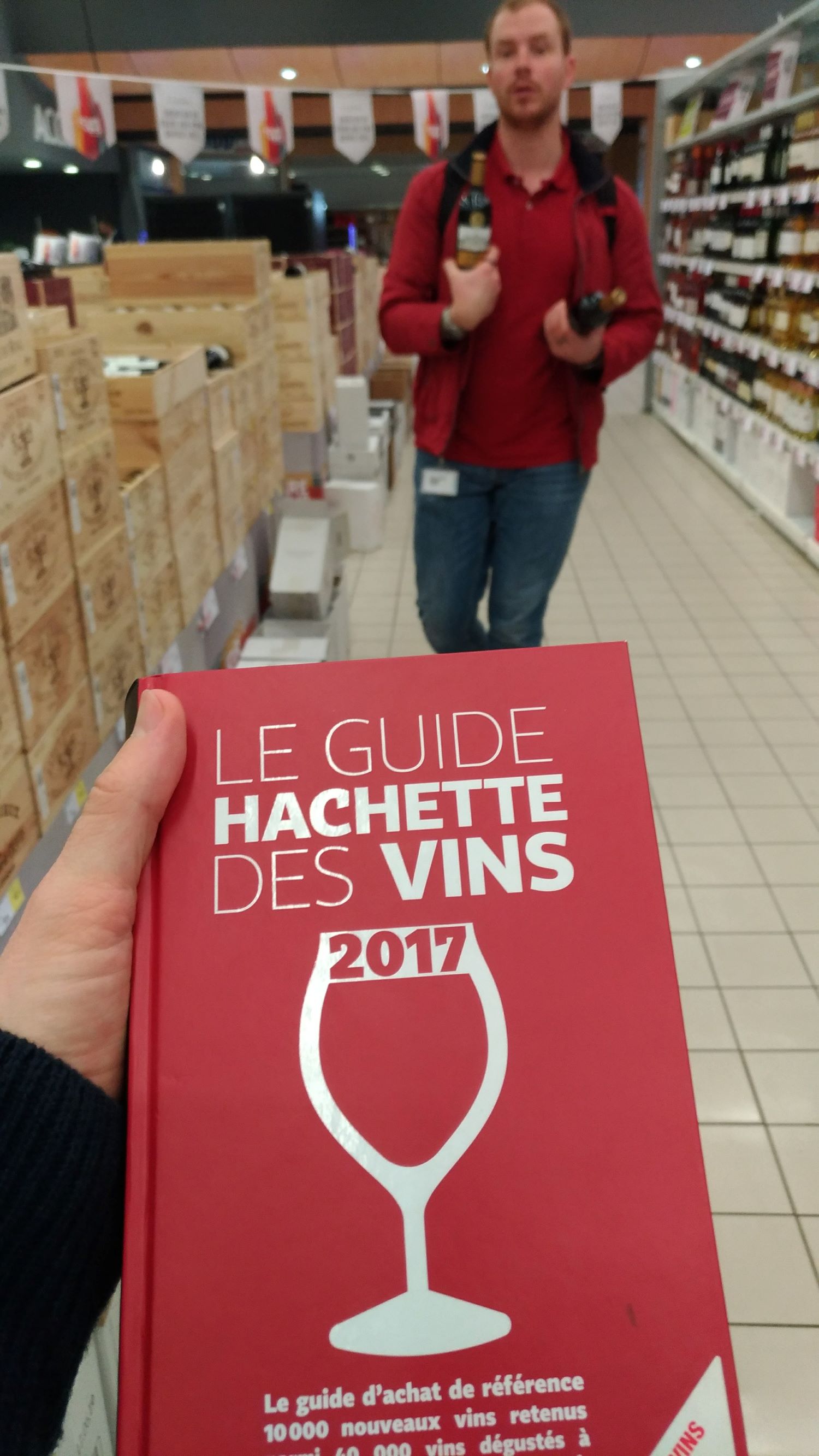
During such tastings, you can buy wine for the future, by placing the appropriate order, right on the spot at the winemaker.
Videos are strictly 18+, and in some countries even 21+
Back in May, you can start hiking in the Hikes aka mountain hikes, but usually not higher than 1000-1500 meters. Any route of the hike with height differences, approximate time of the hike, complexity, public transport timetable can be viewed on a special site - Swiss Mobility . For example, near Montreux there is an excellent route , which Leo Tolstoy loved, and along which daffodils bloom.
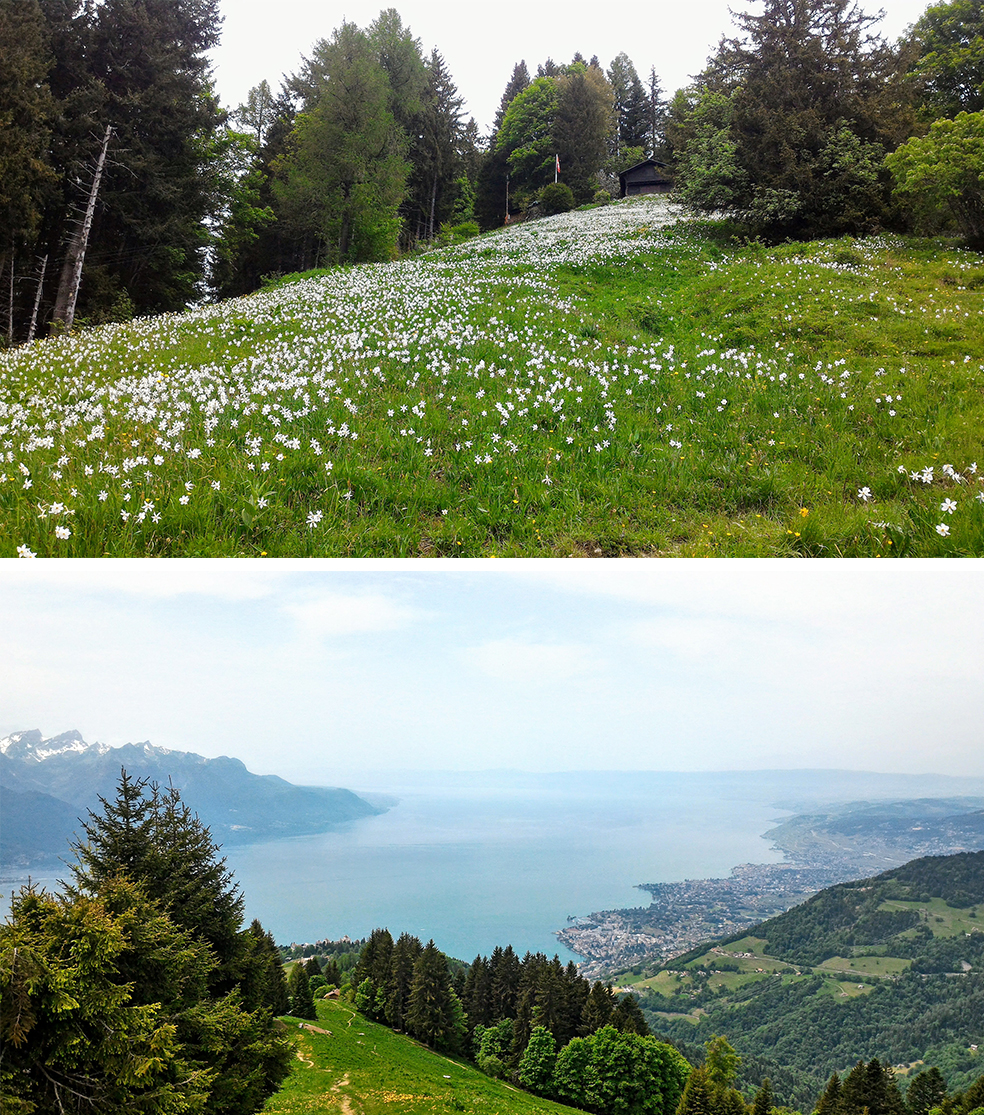
White daffodils blooming in the mountains are amazing sight!
Summer: Heik-Heik-Heik and some lake fun. All summer months - mountain hikes of varying length, complexity and height difference. It is almost like a meditation: you can wander for a long time along a narrow mountain path and in the mountain silence. Exercise, oxygen deprivation, stress, coupled with divine species - a great opportunity to reboot the brain.
Transition from Zermatt to half a kilometer suspension bridge
By the way, do not think that the haik is an exceptionally heavy climb and descent, sometimes the route passes through lakes where you can swim.
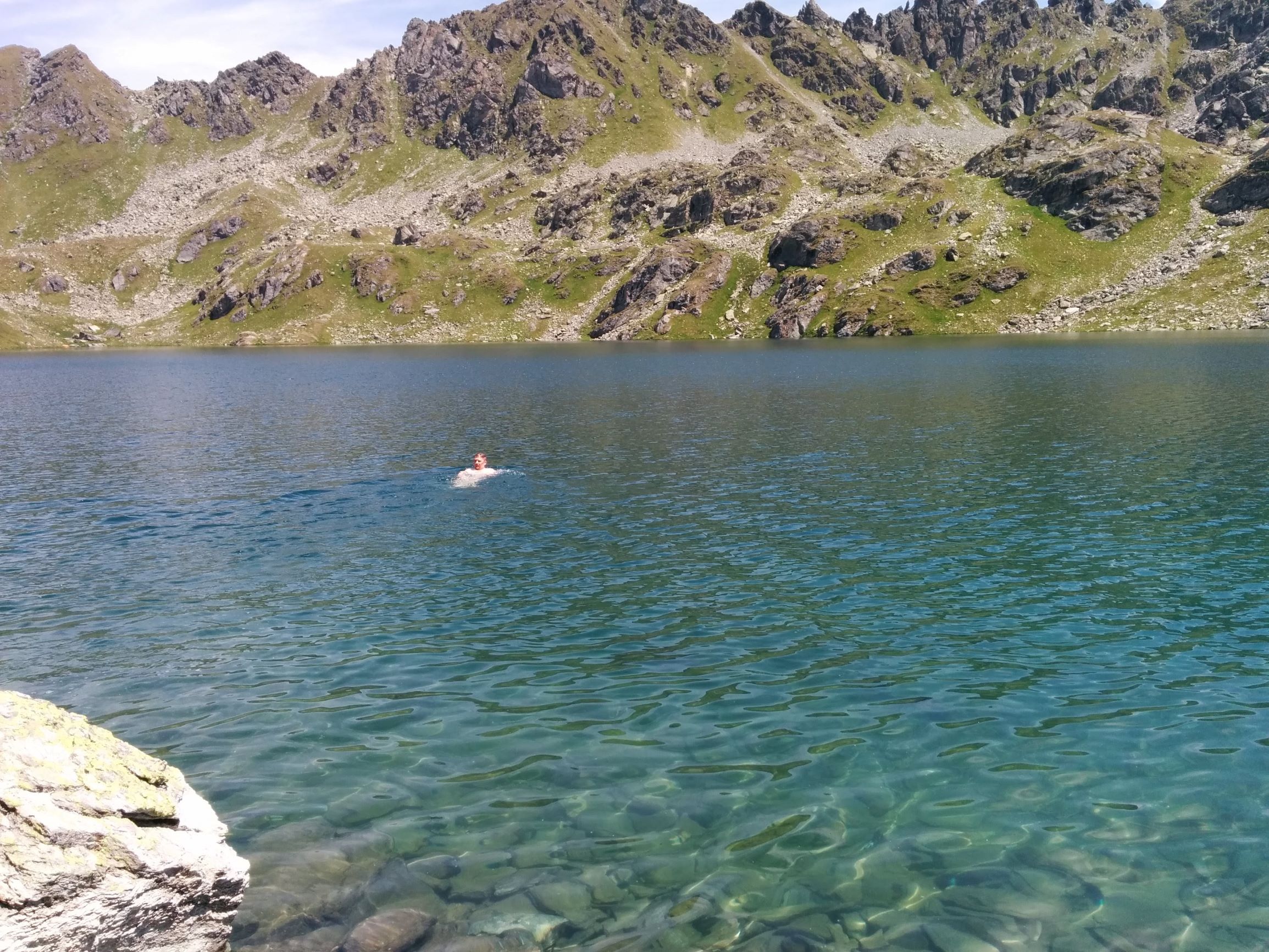
Lake. 2000 meters above sea level. Mid July.
Since Russian-speaking special keen on kebab-mashlyk, then about once a month on the lake we arrange a day of protein and fat. Well, when someone else brings a guitar, the spiritual evening can not be avoided.
Here it is worth noting two aspects: on the one hand, the city organizes containers near the barbecue field, on the other hand, the city authorities install and equip such places themselves. As an example, polygrill in the EPFL itself .
Two more purely summer entertainments are rafting on a boat / mattress along the “mountain” rivers (the most famous one from Thun to Bern), as well as summer pleasure boats on numerous lakes in Switzerland.

On the mountain river at a speed of 10-15 km per hour from Thun you can sail to Bern in 4 hours
The first of August in Switzerland is the day of the formation of the state with numerous fireworks and bonfires around the lake. On the second weekend of August, Geneva moneymakers sponsor the Grand Feu de Geneve, during which thousands of fireworks explode for 1 hour to the accompaniment of music.
Full 4K video from last year
Autumn is the off-season blues for summer and winter. The most incomprehensible season in Switzerland, because it seems to be already wanting to ski after a hot summer, but there will be no snow until December.
September is still a little summer. You can continue the summer program and participate in marathons. But in mid-October, the weather begins to deteriorate to such an extent that it is difficult to plan anything. And in November, the second season of open basements begins, that is, drink from longing for summer.
Traditional and international food
It is also worth saying a few words about local food and cuisine. If the shops are painted in part 2 , then here I would like to literally describe the local cuisine in a few words.
In general, the food quality and delicious, if you do not buy the cheapest in Dener. However, like any Russian person, I do not have enough Russian products - buckwheat, normal Hercules (a la monastic, coarse, since everything is designed for boiling water at best), cottage cheese (either DIY, or you need to prepare a mixture of cottage cheese and Serac from Migros), marshmallows and so on
The history of one buckwheat
Once a Swiss man saw that a Russian girl was eating buckwheat, said that he was very surprised, and in general they fed her horses — not buckwheat — and not a girl. Usually green. Og, rickety Swiss ...
Traditional Swiss ( aka alpine) cuisine dishes are based for some reason on cheese and local edible supplies (sausages, potatoes and other vegetables) - fondue, raclette and roshti.
Fondue - a pan of melted cheese where dunk everything that is not falling.
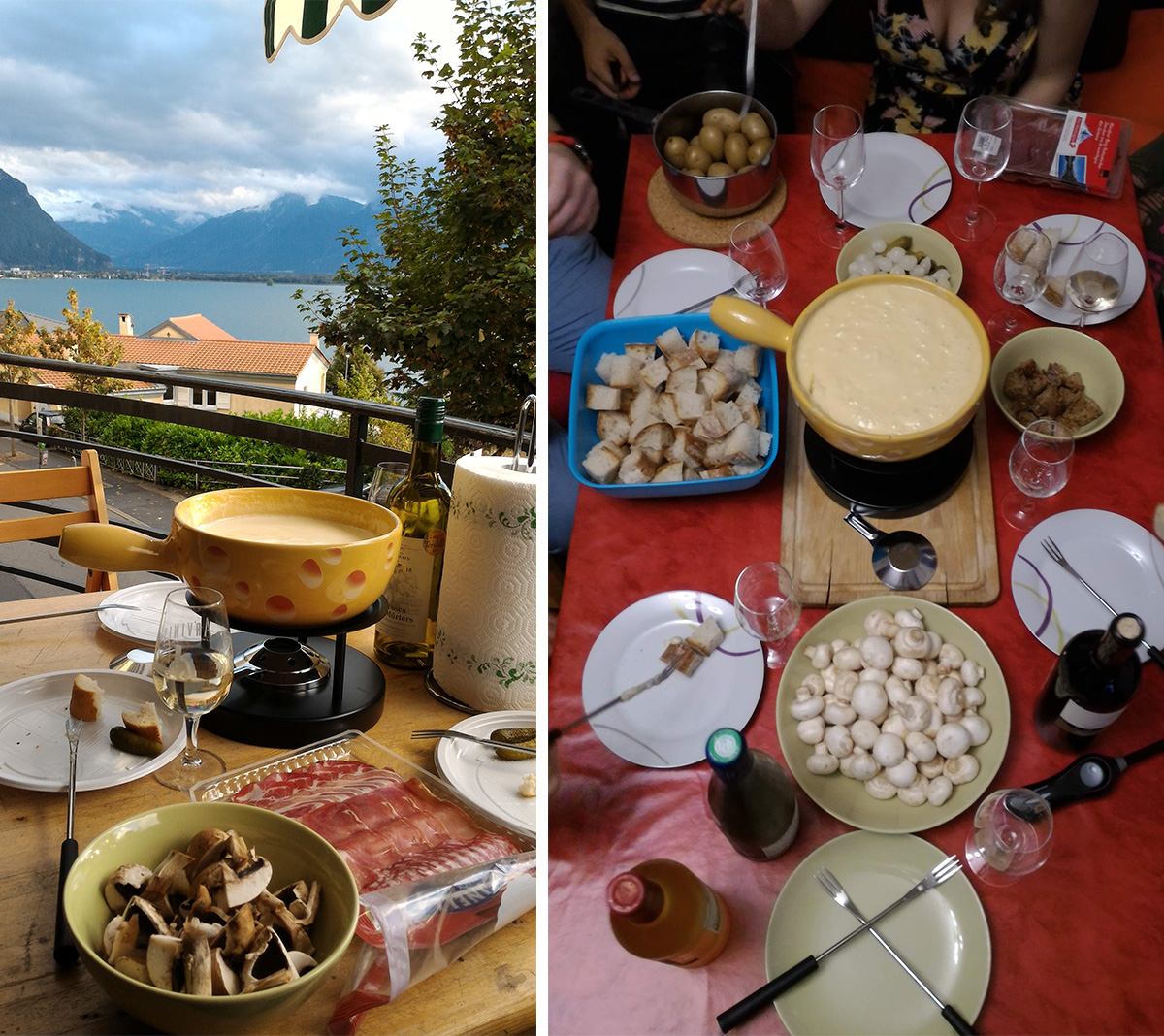
Raclet - cheese, which is melted in layers. Just recently wrote about him .
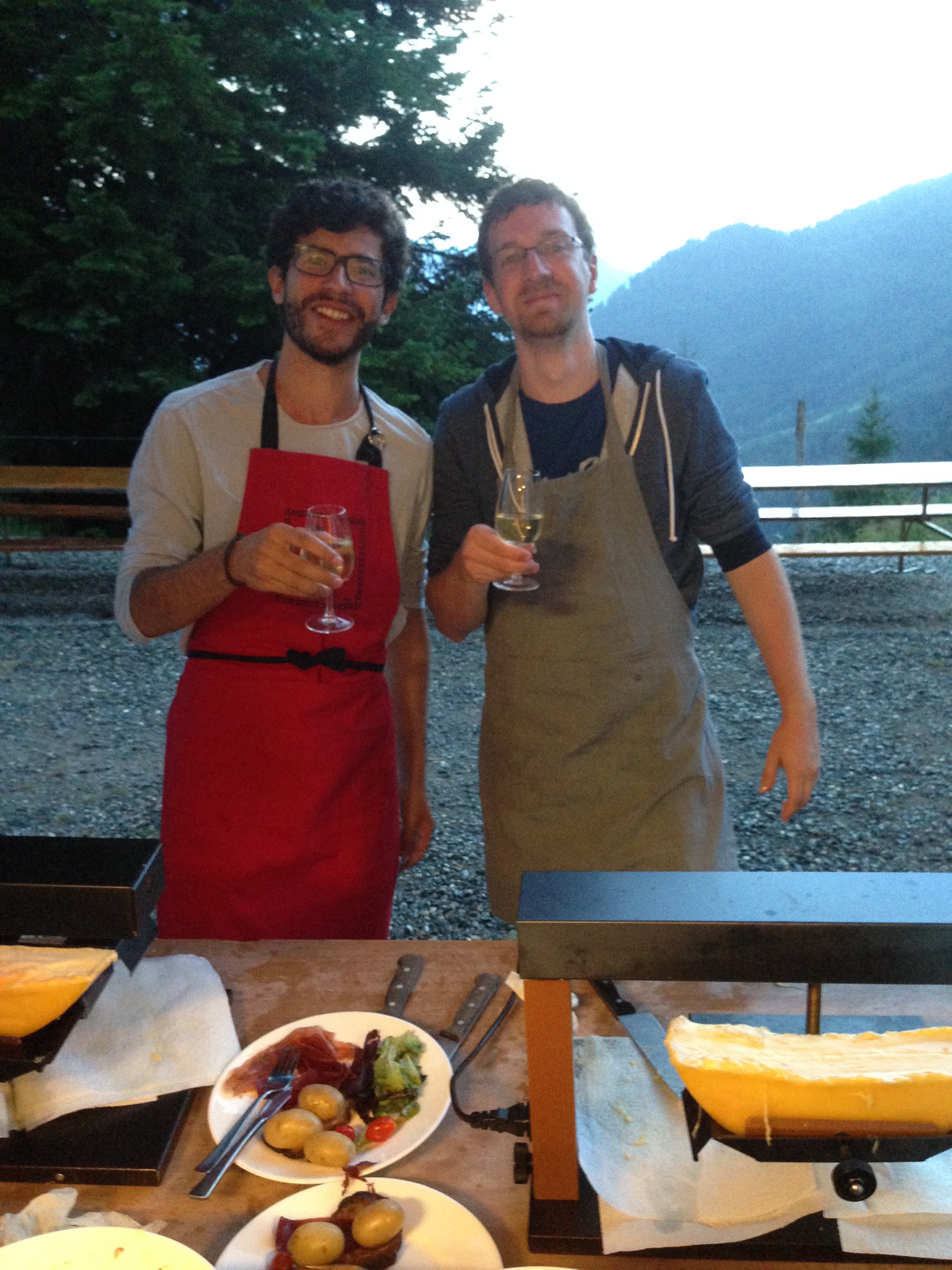
Free Raclett program performed by Indigenous Swiss during the summer Olympic Games of our laboratory. August 2016.
Roesti is a dish of “contention” between the German and French parts of Switzerland, which gave the name to the informal border between the two parts of the country — the already mentioned Roestigraben .
The rest of the kitchen is not much different from the neighbors: burgers, pizza, pasta, sausages, grilled meat - from all over Europe on the crumbs. But what is most interesting and amusing - I don’t even know why - Asian restaurants (Chinese, Japanese and Thai) are extremely popular in Switzerland.
The secret list of the best restaurants of Lausanne (suddenly someone will come in handy)
Petit beef
Wok royal
Eat me
La crêperie la chandeleur
Trois rois
Chez xu
Bleu lézard
Le cinq
Éléphant blanc
Buble tea
Café du grancy
Movenpic
Aribang
Ichi ban
Grappe d'or
Zooburger
Taco taco
Chalet suisse
Pinte bessoin
Wok royal
Eat me
La crêperie la chandeleur
Trois rois
Chez xu
Bleu lézard
Le cinq
Éléphant blanc
Buble tea
Café du grancy
Movenpic
Aribang
Ichi ban
Grappe d'or
Zooburger
Taco taco
Chalet suisse
Pinte bessoin
Limited contingent of “Soviet” troops in the Swiss Confederation
And, finally, it is necessary to describe the contingent, which one way or another will have to face the mountain meadow expanses of the Swiss Confederation.
Of course, cultural and national diversity can be considered a big plus: Tatars, Kazakhs, Caucasians, Ukrainians, Belarusians and Balts - everyone here has had enough of the world. Accordingly, the holidays of borscht, ravioli or real pilaf seasoned with Georgian wine are a multinational reality.
We list the main groups (in fatty strokes, so to speak) of a limited contingent of Soviet troops (95% were born in this country) in the Swiss Confederation in descending order of numbers. Among my friends there is almost all of the groups listed below.
First , the overwhelming majority of the Internet-active population belongs to the “yazmaterey” group. Women who have moved to Switzerland, having a marriage with a Swiss citizen, actively discuss their “children's” problems, share where to find a beautician and make-up artist, and also throw in provocative questions a la “Why is a Russian man better / worse than Swiss?”. There are even professional housewives who lead whole groups on FB and VK. They live in these groups and forums, they are friends, they are offended and even fight. Unfortunately, without them, these groups would not exist at all, there would be no suitable content for attracting new members. Nothing personally - just a statement of fact.
Secondly , students, graduate students and other persons temporarily displaced into Switzerland. They come to study, sometimes they work in their specialty, if they are lucky (see part 3 about employment). Students have student parties and events where internationals are often present from all the nations of the world. I think this is the happiest group, because they have the opportunity and time not only to work, but also to have a good rest. But it is not exactly!
Thirdly , the expats who came to the country by qualified specialists. They often see nothing but work, they are busy with their careers and rarely appear at common events. Unfortunately, their number is vanishingly small compared to the previous two groups.
Fourthly , the eternal seekers of a better life who are able to issue one post about finding a job with a lot of grammatical errors and wait for someone to employ them. Let me remind you once again: the Swiss, a little nationalists in this matter, do not distribute work permits to anyone to the right and left.
Fifth , new and not very Russian, aka “oligarchs”, who have a spare airfield in Switzerland.
It is difficult to collect so many dissimilar personalities, but for holidays common to all of us and interesting events - Victory Day, New Year or barbecue on the lake - up to 50-60 people are possible.
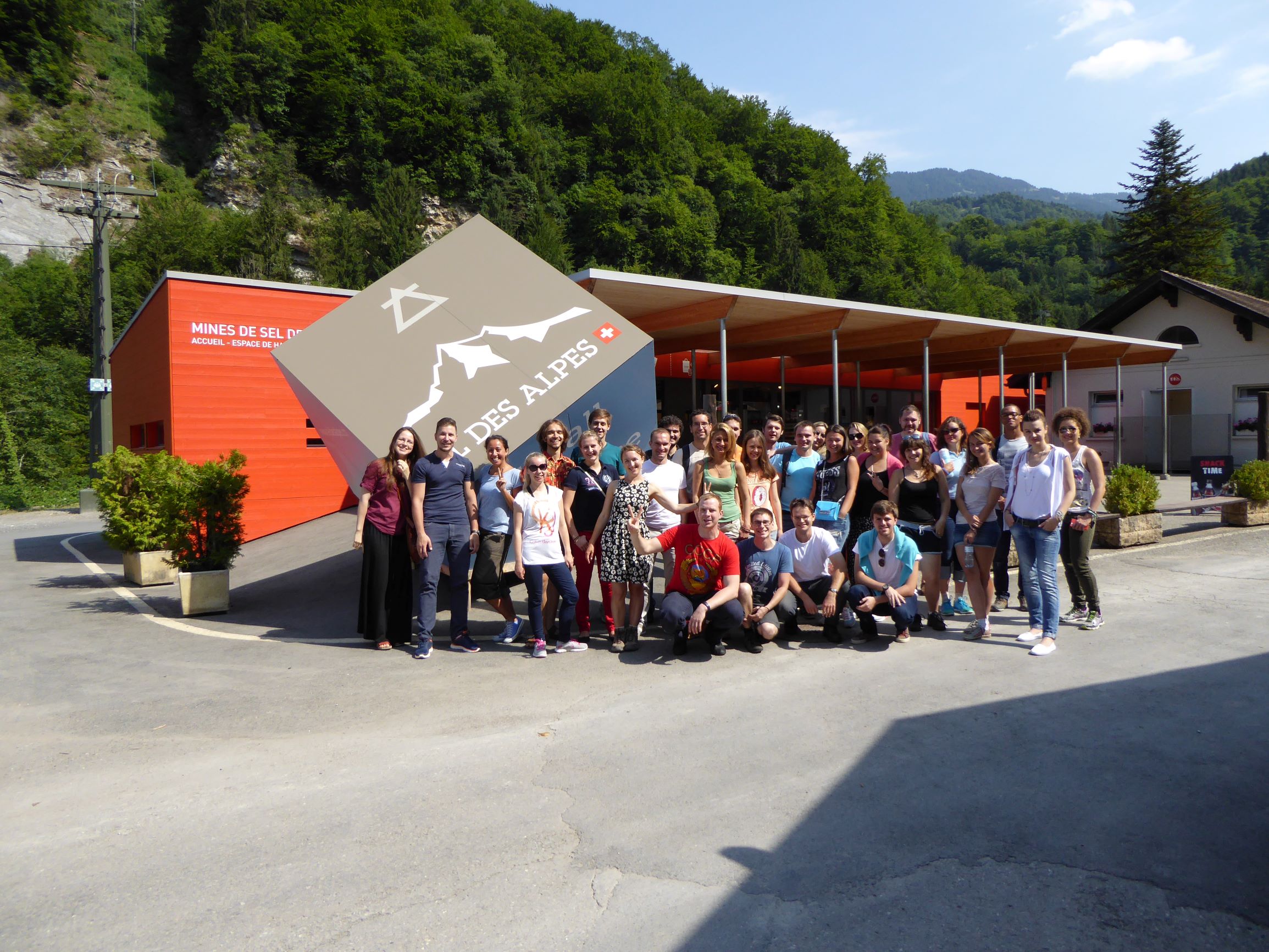
A visit to the mines, where mined salt in the town of Bex
Continuing about the financial side of the question follows ...
PS: For reading material, valuable comments and discussions, my big, very big thanks and appreciation to Anna, Albert ( qbertych ), Jura and Sasha.
PPS: Minute advertising. In connection with the latest trends of “fashion”, I would like to mention that MSU opens this year a permanent campus (and has been teaching for 2 years!) Of a joint university with Beijing Polytechnic University in Shenzhen. There is an opportunity to learn Chinese, as well as to get 2 diplomas at once (IT specialties from the VMC MSU in existence). More information about the university, directions and opportunities for students can be found here .
Video for clarity about creating lawlessness:
Source: https://habr.com/ru/post/454958/
All Articles